
Dynamics

|
Generational Dynamics |
| Forecasting America's Destiny ... and the World's | |
| HOME WEB LOG COUNTRY WIKI COMMENT FORUM DOWNLOADS ABOUT | |
Bank of Cyprus customers will lose 60% of their savings
This morning's key headlines from GenerationalDynamics.com
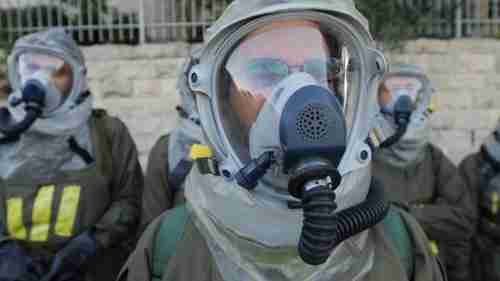 |
I try to be cautious about quoting Debka, whose reporters have contacts within intelligence services in a number of countries. On the one hand, they provide insights that are not available elsewhere. But on the other hand, they sometimes get things wrong. In the past few years, they've predicted several imminent wars that never occurred. Debka's weekly subscriber-only newsletter (sent to me by a subscriber) is laying out plans for imminent military action in Syria, to counter the threat of chemical and biological weapons, either by the regime of president Bashar al-Assad, or by al-Qaeda linked terrorists, such as the jihadist group Jabhat al-Nusra Brigades. The following is a summary of what Debka is saying. I leave it to you, Dear Reader, to do your own evaluation as to how close we are to full-scale war in Syria:
The Islamic Movement of Uzbekistan (IMU) has been trying for years to gain worldwide stature as militant jihadists, but actually has been losing influence in its home regions in Central Asia. The lost of influence is attributed to an information campaign that has been conducted in the region, involving governments, religious leaders, media and NGOs, to explain the differences between true religion and extremism. In fact, the IMU is currently more deeply entrenched in Pakistan and Afghanistan. But with the spring thaw in progress, it's now trying to make alliances with other terrorists to reestablish itself around the volatile Fergana Valley, and all along the border between Kyrgyzstan and Uzbekistan. Central Asia Online
Details continue to come out about how much of the savings of Cyprus savers will be confiscated by the government in return for the EU bailout that prevented bankruptcy. Bank accounts containing less than 100,000 euros will remain, although there will remain strict limits on withdrawals. But savings above 100,000 euros in the Bank of Cyprus will lose 60% or more of their savings:
Quite honestly, this takes my breath away. Bloomberg and AFP
(Comments: For reader comments, questions and discussion, see the 31-Mar-13 World View -- Report: U.S. military action in Syria may be imminent thread of the Generational Dynamics forum. Comments may be
posted anonymously.)
(31-Mar-2013)
Permanent Link
Receive daily World View columns by e-mail
Donate to Generational Dynamics via PayPal
Russia warns that North Korean situation could spiral out of control
This morning's key headlines from GenerationalDynamics.com
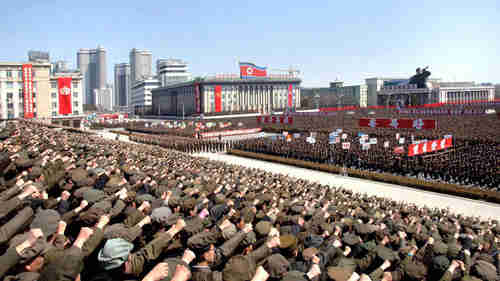 |
Russia's Foreign Minister Sergei Lavrov called on both North Korea and the United States for "all sides not to flex their military muscle." He added:
"We are concerned that alongside the adequate, collective reaction of the UN Security Council, unilateral action is being taken around North Korea that is increasing military activity."
His remarks come a day after the U.S. flew B-2 bombers across South Korea as part of scheduled military drills. Russia and China have criticized flying the B-2s, but refused to criticize North Korea in 2010, when they attacked a South Korean warship with a torpedo, killing 46, or when they attacked and killed civilians on a South Korean island.
The U.S. has been following a strategy of "strategic patience," which means that we don't respond to North Korea's stream of belligerent actions, in the hope that if we're patient long enough, then the North Koreans will stop doing them. That would require North Korea to exhibit a conciliatory mood and behavior, but from the point of view of Generational Dynamics, such a mood would be extremely unusual during a generational Crisis era. What's actually happened is that the North Koreans have been raising the stakes and adopting an increasingly belligerent attitude.
Now the United States is raising the stakes as well with the B-2 overflights, and with actions by the Treasury Dept. targeting North Korea's banks and finances. This appears to signal that the policy of strategic patience is at least partially ending.
Lavrov is right that the actions on both sides to cross red lines can spiral into full-scale war. In fact, from the point of view of generational theory, that's exactly the way that a violent crisis war begins during a generational Crisis era.
Many analysts are referring to the danger of a "miscalculation," which means that a war might begin because of carelessness on one side or the other, but that's not the real danger. Japan's decision to bomb Pearl Harbor was not a careless decision. It was a thoroughly planned decision, based on hallucinatory assumptions. That's often the way generational crisis wars begin, and that's the real danger today. A lot of people believe that Kim Jong-un is a maniac, and maniacs start the worst wars.
"Insanity in individuals is something rare - but in groups, parties, nations and epochs, it is the rule." -- Friedrich Nietzsche
Russia Today and Washington Post
Leaders in Luxembourg are warning that if the Cyprus bailout model -- a levy on bank deposits -- is used in bailouts of other troubled euro zone countries, then investors will pull out of Europe. According to the country's finance minister:
"This will lead to a situation in which investors invest their money outside the euro zone. In this difficult situation, we need to avoid anything that will lead to instability and destroy the trust of savers."
Luxembourg's leaders have good reason to worry. Luxembourg is described as a nation that's like "Cyprus on steroids," with a smaller population but a much larger banking sector, in a great deal of debt.
In fact, the idea of using people's bank savings accounts to bail out countries in debt is very much on the table. The trend is that bailouts are getting more frequent and more serious, and the northern countries, particularly Germany, do not feel an obligation to continue bailing out other countries in Europe. Is Germany's money really Europe's money? The Germans say that it's Germany's money. Bloomberg and Spiegel
The Gulf Cooperation Council (GCC), comprising Kuwait, Saudi Arabia, the UAE, Qatar, Bahrain and Oman, was founded in the early 1980s, in the shadow of the Iran/Iraq war. For the most part, the GCC states and the U.S. have shared a clear common and mutual interest in the stability and security of the Gulf region. But now they're growing further apart on an almost daily basis, with the two sides taking different positions on several major issues:
Other areas of disagreement include Iraq, Yemen, and Bahrain. In the GCC view, the US fails to understand the overall strategic environment, and the dangers associated with the shifts taking place.
The result is that the GCC states have no choice but to act on their own and without consideration of US interests and concerns. Arab News
(Comments: For reader comments, questions and discussion, see the 30-Mar-13 World View -- Luxembourg opposes using Cyprus as a 'template' for euro bailouts thread of the Generational Dynamics forum. Comments may be
posted anonymously.)
(30-Mar-2013)
Permanent Link
Receive daily World View columns by e-mail
Donate to Generational Dynamics via PayPal
Russia orders large-scale military exercises in the Black Sea
This morning's key headlines from GenerationalDynamics.com
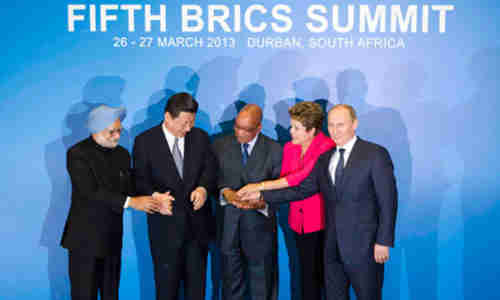 |
Leaders in developing countries have frequently aired complaints about the International Monetary Fund (IMF) and the World Bank, because the Western countries, especially the United States, have too much influence. This is true because the Western countries, especially the United States, supply almost all the money. These institutions were set up following WW II, when the United States agreed to become policemen of the world, and agreed to provide foreign aid to countries around the world suffering from disease, poverty, or starvation.
So the BRICS countries -- Brazil, Russia, India, China and South Africa -- are determined to create a competing organization, the "BRICS bank." According to South Africa's finance minister:
"The roots of the World Bank and IMF still lie in the post-world war two environment. The reforms that have taken place are still inadequate in terms of addressing the current environment. We still have a situation where certain parts of the world are over-represented."
Leaders of the five countries have been meeting in Durban, South Africa, to sign the final agreement creating and funding the BRICS bank. Unfortunately, the effort collapsed, because they couldn't agree on where the money would come from, or even which country would host the bank's world headquarters. All they got was a symbolic agreement that called for a $50 billion emergency fund, with actual money to be provided at some time in the future. Tsk, tsk. Russia Today and Guardian (London)
On the flight back home from the BRICS summit, Russia's president Vladimir Putin issued a surprise order for a large-scale military exercise in the Black Sea, where Russia has two major naval bases in Sevastopol and Novorossiisk. The exercise will involve 7,000 military personnel, 36 warships, and 250 combat armored vehicles. According to Russian officials, the purpose of the drill is to improve readiness of the armed forces.
However, the surprise military exercise comes at a time when the Cyprus financial meltdown is causing a fundamental change in Russia's foreign policy. Putin has been courting Europeans, seeking to establish a privileged political and economic relationship with France and Germany, to undermine NATO and undermine Europe's transatlantic tie with the United States. However, the German attitude that Russia's money in Cyprus was "dirty" money is infuriating the Russians, and the meltdown itself is having a significant negative impact on Russia's economy -- a loss of up to two percent of GDP growth in 2013. With some 80 percent of Russian commercial real estate registered as belonging to Cyprus-based companies, payments and dividends from real estate and energy contracts are frozen, and may be lost. Putin is showing his anger by targeting foreign NGOs in Russia, and the surprise launch of the large-scale Black Sea military exercises may also be a signal of his anger, and of a change of policy away from Europe. Ria Novosti and Jamestown
Jeremy Salt, Bilkent University, Ankara: In the ugly panorama that is the contemporary Middle East, a light hardly flickers on the horizon. Iraq has been destroyed as a unitary Arab state and jihadis unleashed in Syria are burning out another room in the Arab house. Lebanon has again been brought to the brink of implosion through the intrigues of outside governments and local proxies incapable of putting the interests of their country ahead of their sectarian and power intrigues. The Palestinians are divided between those who live under the authority of one man [Mahmoud Abbas, Palestinian Authority] who has bound himself to Israel and the US and two others [Hamas leaders] who have bound themselves to Egypt and Qatar. Fitna – the spreading of division and sowing of hatred amongst Muslims – is being fanned across the region by governments brazen enough to call themselves Muslim. Whether in Iraq, Lebanon, Syria and Iran, Shiism is the enemy. Ceaselessly stirring this pot from the outside are governments that feast on division in the Arab world. Palestine Chronicle
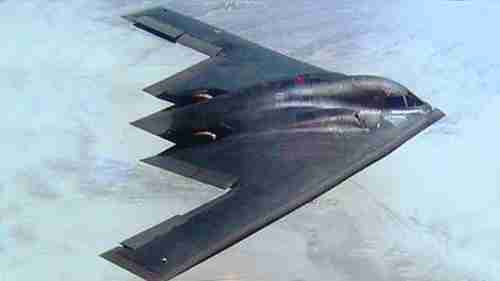 |
The Pentagon sent its distinctive bat-wing-shaped B-2 stealth bombers flying low over the Korean Peninsula this week, dropping fake munitions, in a "routine training exercise." Defense Secretary Chuck Hagel said that the flights were a signal to North Korea that it's risking retaliatory strikes if any military aggression occurs. The show of force was also a signal to China, as B-2 bombers hit the Chinese Embassy in Belgrade, Yugoslavia, in 1999.
The North Koreans, who have already put their military on the highest alert, responded by putting rockets on standby, in preparation for firing at U.S. targets, including the U.S. mainland and military bases in the Pacific and in South Korea. According to state media:
"[Kim Jong-un] said he has judged the time has come to settle accounts with the U.S. imperialists in view of the prevailing situation.If they make a reckless provocation with huge strategic forces, [we] should mercilessly strike the U.S. mainland, their stronghold, their military bases in the operational theaters in the Pacific, including Hawaii and Guam, and those in South Korea."
North Korea has been making increasingly belligerent statements in the last few weeks. One could argue that it's all ranting and bloviating, or one could point out that he's conducted actual military strikes against South Korea in the recent past. CS Monitor and CNN
(Comments: For reader comments, questions and discussion, see the 29-Mar-13 World View -- N. Korea prepares rockets for firing, after U.S. B-2 show of force thread of the Generational Dynamics forum. Comments may be
posted anonymously.)
(29-Mar-2013)
Permanent Link
Receive daily World View columns by e-mail
Donate to Generational Dynamics via PayPal
China conducts naval military drills deep into South China Sea
This morning's key headlines from GenerationalDynamics.com
 |
About half of Madagascar is currently infested by hopper locusts and flying swarms. Each swarm is made up of billions of plant-devouring insects. The plague now threatens 60 per cent of the country's rice production, a staple crop in Madagascar, where 80 per cent of the population lives on less than $1 per day. The locust swarms are also consuming green vegetation that might normally serve as pasture for livestock. The U.N. Food and Agriculture Organizations (FAO) is asking for $41 million to fight the plague through aerial spraying. U.N. FAO
Banks in Cyprus will open their doors on Thursday for the first time in almost two weeks, under harsh restrictions designed to prevent money from leaving the country. Large depositors will lose 40-80% of their principal, depending on which bank the account is in. Individuals will be limited to 300 euros per day withdrawals. The strict limits on credit cards and checks will make their use almost impossible. Individuals leaving the country may not take more than 3000 euros with them. The controls are supposed to expire within a week or two, but that claim seems to be contradicted by another rule: students abroad cannot receive more than 10,000 euros per quarter. Procedures will be set up for companies doing business abroad to prove to government-appointed officials that money transfers are OK.
The capital controls could last weeks, months or years, in complete violation of European Union market rules. So analysts point out that these rules in effect create a "Cyprus euro" that's different from the regular euro, and has a different exchange rate. According to one analyst:
"If you were to impose restrictions equally on capital transfers and payments [in Cyprus], then economically a Cyprus euro would be a different currency vis-a-vis a non-Cyprus euro.You would have to buy non-Cyprus euros to pay for goods and services in other countries. With the rules of supply and demand, the Cyprus euro could then take on a different exchange rate."
This two-level euro situation is going to cause major distortions in Europe's markets. If the controls are in place only a few weeks, then it will be OK. But if they go on for months, then there will be major problems. Cyprus Mail and Reuters
Slovenia's Prime Minister Alenka Bratusek says that the country is different from Cyprus, although the country's banks are deeply in debt and will require 4 billion euros in funding to avoid bankruptcy this year.
According to Bratusek:
"Slovenia won't need aid, we can do this on our own. Our banking system is stable and safe and comparisons with Cyprus aren't valid. Deposits here are safe and the government is guaranteeing them."
Unfortunately, this is laughable. Deposits were safe and government-guaranteed in Cyprus until three weeks ago, but things changed overnight. And we know from experiences with Greece, Spain, Portugal and others that every country's president or prime minister ALWAYS says that they don't need a bailout -- and they say it up until a nanosecond before they ask for a bailout.
So where is Slovenia going to get the 4 billion euros it needs? The plan is to sell bonds -- that is, go more deeply into debt. Unfortunately, we're already seeing a familiar pattern, in that Slovenia's bond yields are starting to surge.
Insured bank accounts of under 100,000 euros came close to being taxed in Cyprus, though finally they were safe, provided that you don't want to withdraw your money. But accounts over 100,000 euros were confiscated at the rate of 40-80%. So small deposits in Slovenia may or may not be safe, but people with a large bank accounts in Slovenia, including Slovenia's citizens, should be thinking very hard about getting their money out while they can. Bloomberg and Washington Post
China's president Xi Jinping has been in Africa the last few days, telling people that China opposes strong countries bullying weak countries. As he was saying those words, China's navy was bullying Malaysia, deep into the South China Sea. James Shoal is an island 50 miles from the coast of Malaysia, clearly within Malaysian waters. But China has sent a naval flotilla, including China's most advances amphibious landing ships, to take military control of Malaysia's island. Last week, a Chinese naval vessel fired flares at a Vietnamese fishing boat that was returning from a fishing ground near the Paracel Islands in the South China Sea. The flares caused the boat to catch fire, although no one was hurt. China announced last year that in 2013 it would start boarding and taking control of other countries' ships in the South China Sea. AP and VOA
(Comments: For reader comments, questions and discussion, see the 28-Mar-13 World View -- Cyprus's banks reopen on Thursday with harsh 'capital controls' thread of the Generational Dynamics forum. Comments may be
posted anonymously.)
(28-Mar-2013)
Permanent Link
Receive daily World View columns by e-mail
Donate to Generational Dynamics via PayPal
Today's Schadenfreude: The 'Ugly Chinese' in Africa
This morning's key headlines from GenerationalDynamics.com
 |
For decades since the end of World War II, the media has been full of "The Ugly American," as a novel, then a movie, then a stereotype, always portraying Americans as arrogant and insensitive in countries around the world.
But now it's China's turn. China's new president Xi Jinping is touring Africa, telling everyone that China believes in "equality among all countries irrespective of their size and strength," and expressing opposition to "the big bullying the small and the strong lording over the weak." I guess he has to hope that Africans don't read the newspapers about China's brutal military bullying tactics in the South China Sea.
China's exploitation of Africa is enormous. China imports oil, coal, minerals and other raw materials from China, and sends hundreds of thousands of traders to Africa to sell them electronics, spare parts, and consumer goods. The Chinese obey few environmental laws or labor laws. Chinese investments in Africa rarely benefit the Africans themselves. There are now 1-2 million Chinese businessmen and women in Africa, mostly living in their own communities separate from the general population, doing the day to day work that gets Africa's oil, coal and minerals back to mainland China.
According to Lamido Sanusi, the governor of Nigeria's Central Bank,
"China takes our primary goods, [such as oil and minerals, to fuel its economic boom], and sells us manufactured ones. This was also the essence of colonialism. Africa is now willingly opening itself up to a new form of imperialism."
But not for long, according to Botswana's president Ian Khama:
"We have had some bad experiences with Chinese companies in this country. [In the future] we are going to be looking very carefully at any company that originates from China in providing construction services of any nature."
He added that other African leaders shared his views. CS Monitor and VOA
China's first ladies have not been very popular, starting with Mao Zedong's first lady, Jiang Qing. In 1938 Mao married her, a beautiful actress half his age, after dumping his second wife, with whom he already had five kids. She rose to power in 1966 when she led the bloody Cultural Revolution, taking revenge against her political enemies. She was extremely unpopular, and was arrested after Mao's death in 1976. She died a few years later, supposedly of suicide. Since then, China's first ladies have remained mostly invisible, wielding power only in the background.
So China's glamorous new first lady is attracting world wide attention. Comments about her attire when arriving in Africa -- black high heels and stockings, an understated leather bag and a light blue scarf emerging from beneath a dark trenchcoat, collar turned up against the wind -- have gone viral inside and outside of China.
Before marrying Xi Jinping, Peng was a well-known singer. In one widely shared video clip, Peng, dressed in military garb, sings about "bravely advancing for victory" amid a chorus line of bayonet-wielding soldiers. The stage show is juxtaposed with stock footage of battle-ready Chinese tanks, jets and warships. Sounds like a marriage made in heaven. Guardian (London)
Many of the details of the Cyprus bailout are not yet known. It's known that private bank accounts under 100,000 euros will not be taxed. It's known that private bank accounts over 100,000 euros will be taxed at 40% or more. But it's not known what "capital controls" will be used to keep depositors from transferring money out of the country when the banks open again.
Anti-German sentiments are growing in many parts of Europe, because they are perceived to have forced the harsh deal on Cyprus -- and indeed, German Chancellor Angela Merkel has expressed enthusiasm for the final deal. "The Germans" has become a "watchword for domination or discipline or austerity" in the eurozone, according to one commentator. According to one Spanish economics professor, "Like Hitler, Angela Merkel has declared war on the rest of the continent, this time to secure economic Lebensraum." Deutsche Welle
Saying that it's the country's "crystal clear judgment" is that it cannot overlook the United States' nuclear threats and military actions any longer, North Korea's Supreme Command put its military on the highest war alert:
"Our people and army are entering the final stage of preparations for war against the United States to defend their country's dignity and sovereignty.The U.S. nuclear war racket has gone beyond the danger line and entered the phase of an actual war, defying the repeated warnings from the army and people of the Democratic People's Republic of Korea (DPRK)."
A South Korean official said a statement by the Supreme Command is very rare because the organ is an emergency body operative only in war time.
The war threat comes on the third anniversary of the North Korean torpedo attack on the South Korean warship Cheonan, killing 46. Yonhap (Seoul)
(Comments: For reader comments, questions and discussion, see the 27-Mar-13 World View -- North Korea's military goes on highest war alert thread of the Generational Dynamics forum. Comments may be
posted anonymously.)
(27-Mar-2013)
Permanent Link
Receive daily World View columns by e-mail
Donate to Generational Dynamics via PayPal
Muslims in Sri Lanka and Burma (Myanmar) targeted
This morning's key headlines from GenerationalDynamics.com
 |
Hardline Sinhalese Buddhist monks in Sri Lanka, members of the Buddhist Strength Force (Bodu Bala Sena, BBS), are targeting Muslims with violence and protests, and conducting campaigns threatening people who patronize Muslim businesses. The violence has included a series of attacks on mosques, and attacks on women wearing Muslim garb. The BBS says its campaign is to protect the predominant Sinhalese race, who, they claim, are dwindling. According to one hardline monk participating in anti-Muslim violence:
"Look around the world - Malaysia, Indonesia, Pakistan, Afghanistan and others, they were all Buddhist countries - but the Muslims destroyed the culture and then took over the country. We worry they're planning it here too."
Sri Lanka is just coming out of a violent civil war between the Tamil ethnic group (Hindus) and the majority Sinhalese ethnic group (Buddhists). Muslims are 10% of the population, and they did their best to stay out of the civil war. But now that the civil war is over, hardline Buddhists are turning their attention to Muslims. BBC and Gulf News
Following anti-Muslim violent riots last week in Meiktila, Burma (Myanmar), Buddhist mobs rampaged through three more towns in the suburbs, destroying mosques and burning down dozens of homes, killing 32, and displacing 12,000. Burma's government is warning that increasing religious violence could threaten democratic reforms that have been put in place in the last three years.
Last year in Rakhine state in southeast Burma, Buddhists massacred Rohingya Muslims who had arrived in decades past from Bangladesh. It was thought that last year's violence was ethnic-based, targeting a community of immigrants. But the Muslims in Meiktila and suburbs are full citizens who have lived there for generations.
Burma's last generational crisis war was the civil war ending in 1958. That was an extremely bloody, genocidal war among Burmese ethnic groups, and today's Burmese government is determined that it shouldn't happen again. From the point of view of Generational Dynamics, Burma is approaching the time when a new genocidal civil war is likely to begin. The increase in violent Buddhist attacks on Muslims could be the early stages of that war. National Post
In the early hours of Monday morning, Cyprus politicians and European finance ministers agreed to a 10 billion euro bailout loan for Cyprus, after Cyprus agreed to harsh conditions to qualify for the loan. Although insured savings accounts (containing amounts under 100,000 euros) will be spared, larger accounts will be taxed 40% or more. Cyprus's banking industry will be restructured, throwing thousands of people out of work. Capital controls will be imposed, preventing anyone from transferring money out of the country. Banks will remain closed until at least Thursday, and ATM withdrawals will be restricted to 100 euros per day. Cyprus's largest industry, serving as a haven for offshore banking, is now pretty much destroyed.
People with large sums in European banks are thinking twice now about how safe their money is. Losing 40% of your savings is a hell of a big hit, and now everyone knows that it's quite possible that the same thing could happen to any bank account, especially in troubled countries like France, Spain, Greece and Italy. In fact, Some people are claiming that the Cyprus deal is very "good news" for American banks, because institutional investors will be moving their money out of Spain's, France's and Italy's banks, and moving it to UK or American banks, where they believe that it will be safer. Reuters and Spiegel
Investors in lots of countries have been hurt by the confiscation of large chunks of their savings in Cyprus banks, but Russia is being pegged as the supervillain, and the feeling is mutual. Russia's Prime Minister Dmitry Medvedev is calling the plan "theft," and said, "The stealing of what has already been stolen continues."
One popular Russian news commentator said that the last time a Western European government proceeded so recklessly was when Adolf Hitler expropriated the Jews, referring to money held by the Jews as "dirty." That was precisely how Europe was talking about Russian assets deposited in Cyprus, he added.
Russia was given an opportunity last week to participate in the bailout, but refused, saying the Cyprus wasn't giving enough in return. But some commentators are saying that Russia's president Vladimir was politically unable to bail Cyprus out, because it would have meant bailing out Russia's oligarchs. Not only are they very unpopular, but many elite groups are gloating over the losses of their competitors.
Nonetheless, the Cyprus deal is going to create a lot of enemies in Russia, and is going to have a negative effect on Russia's economy. As the impact sinks in, some Russians may be plotting revenge. Any European money in Russian banks could be considered for confiscation if there were a crisis in the future, and on cold winter nights, Russia could cut off natural gas exports to Europe, as happened in the past. Spiegel and Jamestown
(Comments: For reader comments, questions and discussion, see the 26-Mar-13 World View -- Buddhists attack Muslims across Asia and Russia considers revenge for Cyprus thread of the Generational Dynamics forum. Comments may be
posted anonymously.)
(26-Mar-2013)
Permanent Link
Receive daily World View columns by e-mail
Donate to Generational Dynamics via PayPal
Israel fires surface-to-surface missile into Syria
This morning's key headlines from GenerationalDynamics.com
 |
A rebel coalition calling itself "Seleka" has attacked the capital city Bangui of Central African Republic (CAR) on Sunday, in a fierce battle that killed nine South African soldiers, among 400 that were deployed in the country as military trainers. President Francois Bozize was forced to flee, and is thought to be in hiding in the neighboring Democratic Republic of Congo. Bangui, a city of 600,000 people, is itself is in total chaos, with open looting and violence. France is calling for an emergency meeting of United Nations Security Council. France already had 250 soldiers in Central African Republic, and is sending another 300 troops, to stabilize the situation and provide protection for the 1,200 French citizens in the country. South Africa will send additional troops as well. CAR is 80% Christian. Reuters
Mali's army, backed by troops from France and Chad, say that they've repelled attack on the city of Gao in northern Mali by al-Qaeda linked Islamists. The Islamists had controlled Gao for 10 months, until they were driven out by French forces in an operation that began in January. It's thought that the Islamists have been hiding in caves in the surrounding area, preparing to return when the French forces leave. France has 4,000 troops in Mali, and hopes to begin withdrawal at the end of April. AFP
The leader of Syria's opposition National Coalition, Ahmed Moaz al-Khatib, has resigned, following a meeting with the European Union which, he said has achieved nothing:
"I announce my resignation from the National Coalition, so that I can work with a freedom that cannot possibly be had in an official institution.For the past two years, we have been slaughtered by an unprecedentedly vicious regime, while the world has looked on.
All the destruction of Syria's infrastructure, the detention of tens of thousands of people, the forced flight of hundreds of thousands and other forms of suffering have been insufficient for the international community to take a decision to allow the people to defend themselves."
His description of what's been going on is certainly accurate. The various "peace plans" put forward by the European Union, the United Nations, and the Arab League, have all been total farces and have actually made the situation worse, because the regime of Bashar al-Assad has used them as a cover, pretending to be working for peace while stepping up massive attacks on innocent women and children in cities across the country, with the full support and cooperation with the Russians. The Syria situation makes a mockery and a joke of the United Nations. Al Jazeera
Israel's army fired a surface-to-surface missile from Golan into Syria on Sunday, destroying a Syrian army position. The missile was a response to gunfire from Syria that targeted Israeli soldiers patrolling the border. Reportedly, two Syrian soldiers were wounded. Jerusalem Post
Cyprus's politicians, meeting with European finance ministers in Brussels, are working around the clock to convince the Europeans that they've done enough to deserve the 10 billion euro bailout. The Europeans want Cyprus to come up with more money by restructuring the banking system and by levying money from depositors. It now appears that accounts containing over 100,000 euros will face a levy of 25%. If no deal is reached on Monday, then Cyprus's banks may collapse completely on Tuesday. In anticipation, the Cyprus central bank is imposing a daily withdrawal limit of 100 euros from ATMs, to prevent a bank run. AP
(Comments: For reader comments, questions and discussion, see the 25-Mar-13 World View -- France sends troops to Central African Republic in chaos thread of the Generational Dynamics forum. Comments may be
posted anonymously.)
(25-Mar-2013)
Permanent Link
Receive daily World View columns by e-mail
Donate to Generational Dynamics via PayPal
Lebanon's government collapses as Syria's turmoil crosses border
This morning's key headlines from GenerationalDynamics.com
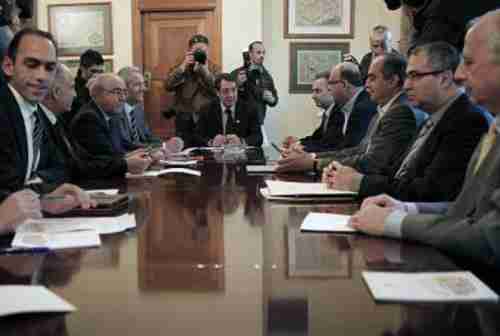 |
Cyprus's President Nicos Anastasiades and government officials have been working through the weekend to try to find 6 billion euros to satisfy the EU's qualifications for a 10 billion euro bailout loan. However, there are no easy solutions, and the latest plan is a 20-25% "tax" on deposits over 100,000 euros, something that will hurt the Russian oligarchs who have been either investing or money-laundering large sums in Cyprus for years. Many Russians are going to be badly hurt in losing 25% of their savings, and there may be some retaliation against Europe, such as by freezing or taxing European assets invested in Russia. Cypriot citizens are also close to a state of panic, in view of the approaching chaos when the banks open again, on Tuesday at the earliest. The moment that the banks open, every account holder will be at the bank to withdraw their money, for fear that a new bailout will be needed in the near future. Cyprus's major industry for the past few years has been banking, and that industry is about to collapse, as Russians and other large depositors withdraw their money. The collapse of the banking industry will lead to job losses, and already there are large public protests by bank employees for exactly that reason. Everyone in Europe is looking desperately for a way to kick the can down the road for a few months, but Europe may have run out of road. Guardian and Kathimerini
One possible scenario is that Cyprus will leave the euro zone, and return to its former currency, the pound. However, Turkey's minister to the EU has a better idea -- use the Turkish Cyprus lira as currency. The lira is already used in the northern part of Cyprus, the part occupied by Turks since the end of the bitter 1974 between Greece and Turkey. Separately, Turkish Cyprus minister has suggested that if Greek Cyprus's banks all went bankrupt, the citizens could open accounts in Turkish Cypriot banks. Hurriyet (Istanbul)
Lebanon's Prime Minister Najib Mikati dissolved the government and resigned on Friday, after a fallout among ministers, and called for a "National Dialog":
"Today, I announce the resignation of the Cabinet in the hope it will constitute the only gateway and [call on] the central political blocs in Lebanon to fulfill their duties.My conscience compels me to take this decision to pave the way for the return to [National] Dialogue under the auspices of the president, to which there is no alternative, [paving the way for formation of] a salvation Cabinet that includes all political forces."
The conflict in Syria has been increasingly spilling across the border into Lebanon, especially in the northern Lebanon city of Tripoli. In recent days, warplanes from the regime of Syria's president Bashar al-Assad have been striking targets in northern Lebanon. Sectarian fighting has been increasing around Tripoli, and really surged after Mikati announced his resignation.
Lebanon's government itself is split along sectarian lines. The terrorist group Hezbollah is part of Lebanon's government, supported by Iran. Hezbollah has been supporting the al-Assad regime, causing conflict within Lebanon itself. Lebanon has gone without any government for long periods in the past, and with the collapse of Mikati's government, that may happen again. Daily Star (Beirut) and Reuters
On Friday, Turkey's prime minister Recep Tayyip Erdogan said he had fully accepted Israel's apology for the 2010 Mavi Marmara incident, but on Saturday, he appeared to be backing off. Erdogan gloated, saying of the apology that "it was offered the way we wanted," but said that he would not immediately agree to the exchange of ambassadors:
"We will see what will be put into practice during the process. If they move forward in a promising way, we will make our contribution. Then, there would be an exchange of ambassadors.We took a stand but we managed to resolve the process without being [overly] intractable. We are at the beginning of a process of elevating Turkey to a position so that it will again have a say, initiative and power, as it did in the past."
Erdogan particularly appeared to be linking an exchange of ambassadors to the end to Israel's blockade of Gaza, something that's not going to happen. Erdogan's last sentence reflects the fact that Turkey has been marginalized in Mideast peace negotiations, because Erdogan has refused to talk to anyone from Israel. YNet and Hurriyet (Ankara)
Erdogan plans to launch his peace initiative by visiting the Palestinian territories:
"I may eventually visit Gaza and the West Bank in April. This visit would take place in the context of a general effort to contribute to the resolution process [of the Palestinian issue]."
Meanwhile, the new U.S. Secretary of State John Kerry is going to be shuttling around the Mideast to launch a new peace process, and "trying to find common ground between both sides to see if there is ground to resume peace talks."
The earliest Mideast peace process that I remember was Henry Kissinger's "shuttle diplomacy" in the early 1970s. Since then, there has been one new peace proposal after another. However, as I wrote in "Mideast Roadmap - Will it bring peace?" in 2003, no peace process can possibly work, because Jews and Arabs will be re-fighting the genocidal war that followed the 1948 partitioning of Palestine, and the creation of the state of Israel. Al-Arabiya
(Comments: For reader comments, questions and discussion, see the 24-Mar-13 World View -- Cyprus and Russia face bitter financial chaos next week thread of the Generational Dynamics forum. Comments may be
posted anonymously.)
(24-Mar-2013)
Permanent Link
Receive daily World View columns by e-mail
Donate to Generational Dynamics via PayPal
Generational Dynamics website attacked by hackers
This morning's key headlines from GenerationalDynamics.com
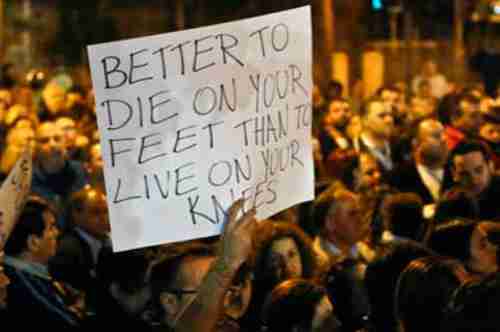 |
Cyprus's government will be spending a long, tough weekend in negotiations to prevent total collapse of the economy on Tuesday. Cyprus has to find 6 billion euros to contribute to a bailout fund to which the EU will provide a 10 billion euro loan. The original plan was to tax small bank savers 6.7% of their savings, and to tax large savers, with accounts above 100,000 euros, 9.9%. This was the original "Plan A" formula, and it was adopted by Cyprus did not want to go above a 10% haircut for the banks' Russian oligarch depositors. The 6.7% tax for small savers has now been thrown out for good, as accounts under 100,000 euros are supposed to be protected by deposit insurance. To make up the difference, first Russia was asked to help bail out Cyprus, but that deal collapsed completely on Friday. Also, Cyprus is considering nationalizing its pension system. The Greek Orthodox Church has also volunteered a large amount of real estate. But those won't bring in nearly enough money. So that leaves only one major source of money: The Russian oligarchs with billions of euros of deposits in Cyprus banks. There is now talk of taxing large accounts 20-25%, which can only be viewed as punishment for Russia for not helping Cyprus out when they had the chance. Kathimerini and Cyprus Mail
The Generational Dynamics web site was attacked by hackers on Friday and crashed. The site will be brought back up over the weekend with limited functionality and content. All content will be available again in a few days.
No data was lost from the Generational Dynamics forum.
I may have lost some e-mail messages sent to me on Friday. Please consider re-sending any messages that you sent between 11 am and 7 pm ET.
As before, I apologize for any inconvenience.
Turkey's president Recep Tayyip Erdogan scored a major diplomatic coup on Friday when Israel's prime minister Benjamin Netanyahu apologized to Erdogan for the deaths of nine Turkish citizens in the 2010 Mavi Marmara flotilla incident. The apology was mediated by U.S. President Barack Obama as he ended his visit to the Mideast. The Mavi Marmara was a boat in a flotilla that was launched to break Israel's sea blockage of Gaza. The Israeli Defense Forces (IDF) boarded the flotilla ships, and in the exchange of fire, the nine Turkish citizens were killed. Erdogan cut diplomatic relations with Israel, and made the following demands, which have now been addressed by Netanyahu's apology:
Palestinian commentators condemned Erdogan's acceptance of the apology, because there was effectively no change at all to the status of the Gaza blockade.
The break in diplomatic relations between Turkey and Israel has caused problems for both countries. Israel has been facing increased isolation throughout Europe, especially with Turkey which had been a major trading partner. Turkey faced isolation as well, as became apparent when Egypt and Turkey were mediating last year's war between Israel and Hamas, and Erdogan had to bow out because he refused to talk to the Israelis. The restoration of diplomatic relations will allow closer cooperation on the Syria issue, and so it's probably a bitter pill for Iran, Hezbollah and the Syrian regime. Israel Ministry of Foreign Affairs and Jerusalem Post and Hurriet (Ankara)
 |
Officials have declared a state of emergency in Meikhtila in central Myanmar after three days of ethnic violence between Buddhist monks and Muslims. Troubles began on Wednesday after an argument broke out between a Muslim gold shop owner and his Buddhist customers. A Buddhist monk was among the first killed, inflaming tensions that led a Buddhist mob to rampage through a Muslim neighbourhood. At least 6,000 Muslims have fled their homes and taken refuge in a stadium. Meikhtila is a majority Muslim city in the majority Buddhist nation of Burma. Relations between Muslims and Buddhists have been cordial for decades, but tensions have been increasing since last year's incident in Rakhine state in southeast Burma, where Buddhists massacred Rohingya Muslims who had arrived in decades past from Bangladesh. AP
(Comments: For reader comments, questions and discussion, see the 23-Mar-13 World View -- Obama negotiates Israeli apology to Turkey for flotilla incident thread of the Generational Dynamics forum. Comments may be
posted anonymously.)
(23-Mar-2013)
Permanent Link
Receive daily World View columns by e-mail
Donate to Generational Dynamics via PayPal
Cyprus nears collapse after EU issues an ultimatum
This morning's key headlines from GenerationalDynamics.com
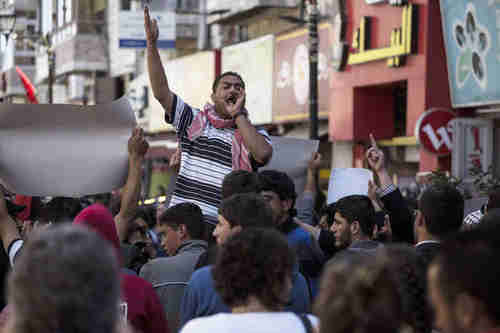 |
We're close to a very important ten-year anniversary that nobody is going to remember but me: On May 1, it's the tenth anniversary of President George Bush's "Mideast Roadmap to Peace." I remember it because I wrote my first major Generational Dynamics prediction at that time, explaining why the Roadmap could not succeed. (See "Mideast Roadmap - Will it bring peace?" from 2003)
Listening to President Obama in Jerusalem on Wednesday and in Ramallah on Thursday, it might as well have been George W. Bush. I don't believe that there was a single thing that I heard that was substantively different from anything that I would have heard if Bush were still President.
In particular, Obama had a major reversal in rhetoric regarding settlements. In the past, he's called for an end to West Bank settlements. Today, he said only that settlements were an area of disagreement that would be solved only when the core issues were resolved -- and the core issues were creating a contiguous state of Palestine, and security for Israel.
I did hear some pro-Obama commentators spin this as a "turning point" in Mideast peace, which is absurd. There was exactly the same bubbly spin after Bush revealed his Roadmap to Peace. But the most bubbly time was when Yasser Arafat died in November, 2004. The pundits, as well as President Bush, believed that Arafat had been the only person standing in the way of Mideast peace, and there were grins all around, in the belief that Mideast peace was near. The grins turned into ebullience when Mahmoud Abbas was elected as Palestinian leader. Ariel Sharon was also ebullient, and agreed for Israel to withdraw from Gaza. You know the rest. There was no Mideast peace, and there have been three regional wars since then.
To the contrary, a number of Palestinians were protesting President Obama's visit to Ramallah. Some are quoted as saying that President Obama is worse than President Bush because Obama had raised everyone's hopes with the Cairo speech in 2009, but has done nothing since then.
Obama made numerous absurd promises when he was running in 2008. He said, "This was the moment when the rise of the oceans began to slow and our planet began to heal." He said he would be guided by facts, not like President Bush, who was guided by ideology and ignored facts. He would cure global warming, close Guantanamo, become friendly with Iran and North Korea, bring a two-state solution to Palestinians and Israelis, beat the Taliban and al-Qaeda, end the financial crisis, reflate the real estate and stock market bubbles and provide universal health care. He has not yet achieved a single one of these objectives, and many of them are total failures.
I was not critical of Obama during the 2008 campaign, because I assumed that his promises were the usual fatuous nonsense typical of all politicians, and I expected him to become more sensible once the election ended, assuming he won. But I was shocked when he doubled down on his predictions after he won. What this showed was that he actually believed the absurd promises he was making. McClatchy
The term "cognitive dissonance" refers to the mental problems that occur when deeply held beliefs are contradicted by real life events. The literature contains numerous examples of what happens. Some of the most dramatic examples are Christians who adopt the belief that Jesus Christ will return to earth on a certain day, and then have to deal with the reality when it doesn't happen.
For example, suppose a group of people believe that Jesus Christ will return on July 1, and that true believers will go to heaven, and the rest will die. They give their possessions away, and gather on a mountaintop, waiting for the return. July 2 comes, and they're still on the mountaintop, waiting. At that point, research has shown that they don't abandon their previous beliefs, but they double down on them and adapt them -- they go out and become proselytizers. Where previously they had kept their beliefs secret, and they now claim that God has decided to give the world one more chance, and only believers will survive.
This concept is important in Generational Dynamics theory, because cognitive dissonance becomes the dominant psychological factor during a generational Crisis era. After a generational Crisis era ends (such as the end of WW II), everyone is pretty much united and realistic about how the world works. Decades later, when the next crisis era begins, there are opposing political camps that hold ideologies as strong as those of the religious fanatics who gather on the mountaintop. They invest in stocks or make other personal life commitments based on their ideological beliefs. As shocks begin to occur (financial collapses, regional wars, and other generational "regeneracy" events), all of these core ideological beliefs are challenged, causing cognitive dissonance.
A country is in a real crisis at this time, because the war is combined with the mental conflicts that can almost paralyze many people, including many leaders. One story that always sticks in my mind is that when Hitler's Nazis invaded Russia, Stalin went into such a state of shock that he was unable to function for a few weeks, allowing Hitler to gain valuable time.
President Obama has shown flexibility so far, as one after another of his core ideological beliefs have been destroyed by world events. His reversal on Israeli settlements is a good example of that.
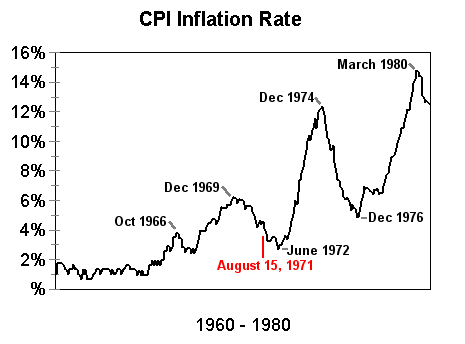 |
There is one major example left: Obamacare. I condemned this proposal when it was first made because it was a repeat of President Nixon's wage-price controls, which were an economic disaster. Nixon's wage-price controls were supposed to reduce inflation, but instead inflation surged to historically high levels under the controls. Obamacare was supposed to reduce health care costs, but instead health care costs are already surging to historically high levels. Obamacare is shaping up to be as much of an economic disaster as Nixon's wage-price controls. Obama is thoroughly committed to seeing Obamacare implemented. The typical cognitive dissonance behavioral pattern indicates that he will do anything that he has the power to do to force Obamacare to be implemented.
I've said hundreds of times that it's a basic principle of Generational Dynamics that great events of history are not determined by politicians or political policy or ideology. They're determined by generational trends that are completely out of control of politicians. The generational trends that I've been writing about for years are all coming to pass, and there's nothing that Barack Obama or any other politician can do to stop them. NPR
The generational trends that I've been writing about for Europe are also unstoppable. Cyprus's government is preparing for the worst, after the EU issued an ultimatum requiring Cyprus to raise 5.8 billion euros by Monday, or face banking collapse when the European Central Bank cuts off all liquidity to Cypriot banks. The original "Plan A" proposal, now rejected, would have levied taxes on both small and large bank depositors. Cyprus has begged Russia for bailout money, but that avenue now appears closed. In a new "Plan B" proposal on Thursday, the government proposed to parliament a "solidarity fund" that would bundle state assets, including future gas revenues, as the basis for an emergency bond issue, likened by JP Morgan to "a national fire sale." Russia is considering the possibility of of investing in the fund, either taking ownership of the banks, or buying rights to offshore gas and oil fields. It's going to be a very tense weekend, and a lot of people are saying that Cyprus might leave the euro on Monday. Reuters
(Comments: For reader comments, questions and discussion, see the 22-Mar-13 World View -- Cognitive Dissonance and the 'Mideast Roadmap to Peace' thread of the Generational Dynamics forum. Comments may be
posted anonymously.)
(22-Mar-2013)
Permanent Link
Receive daily World View columns by e-mail
Donate to Generational Dynamics via PayPal
Obama and Netanyahu appear to agree on military action in Iran
This morning's key headlines from GenerationalDynamics.com
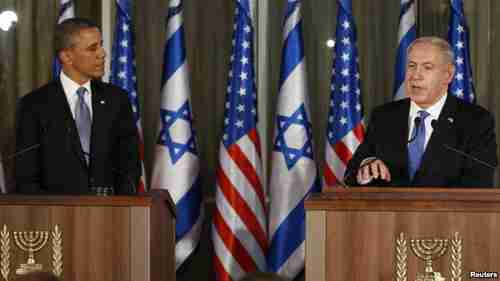 |
In their joint press conference in Jerusalem on Wednesday, President Barack Obama and Israel's Prime Minister Benjamin Netanyahu appeared to agree that military action must be used to prevent Iran from having a nuclear weapon. However, they appeared to differ on the timing. Obama said:
"A nuclear armed Iran would be a threat to the region, a threat to the world and potentially an existential threat to Israel,” Obama said. “Our policy is to prevent Iran from having a nuclear weapon."
This would imply that military action would be taken only at the last minute, just in time to prevent final development. However, Netanyahu is demanding that Iran be stopped much earlier, before it can produce the enriched uranium needed in a nuclear weapon.
As I've said many times in the past, my expectation is that we'll never make a military attack on Iran. This is my personal view based on a generational analysis: Iran is ruled by hardliner survivors of the 1979 Great Islamic Revolution, but most people under 30 are pro-Western and have no particular desire to see Israel pushed into the sea. Even if Iran develops a nuclear weapon, I can't see a scenario where it would be used against Israel. And to repeat what I've said before, in the coming Clash of Civilizations world war, Iran will be allied with the West, including Israel, against China, Pakistan and the Sunni countries. It's certainly possible that, in the interim, Israeli leaders will panic and attack Iran, but my expectation is that such an attack is unlikely. VOA and Ynet
With American forces gone from Iraq, Sunni militants in al-Qaeda in Iraq are stepping up terrorist attacks on the Shia-led government, and promised to go further.
At the same time, there's a lot of nonsense in the media about whether we should have launched the 2003 ground invasion. The best response to the nonsense is this quote from Tony Blair in 2010:
"Sometimes what is important is not to ask the March 2003 question but to ask the 2010 question. Supposing we had backed off this military action, supposing we had left Saddam and his sons who were going to follow him in charge of Iraq, people who had used chemical weapons, caused the death of over a million people? What we now know is that he retained absolutely the intent and the intellectual know-how to restart a nuclear and a chemical weapons program when the inspectors were out and the sanctions changed."
The only reason that we know that Saddam didn't have WMDs is because of the ground invasion. Blair said that Saddam had "the intent" to develop a nuclear and chemical weapons program. If it weren't for the invasion, we still wouldn't know to this day, whether Saddam had or was developing WMDs. Just as important, neither would Iran. So Iran would have its own chemical weapons program to counter Iraq's, and Wednesday's press conference with Obama and Netanyahu would have been discussing a chemical weapons arms race between Iran and Iraq, in addition to nuclear weapons development in Iran. (See "The Iraq war may be related to the bombing of Hiroshima and Nagasaki." from 2008.) Guardian (London)
Cyprus pleaded for help from Russia on Wednesday, the day after its Parliament rejected the European bailout terms, without a single supporter. However, the crisis appeared to deepen on Wednesday for several reasons:
Moscow has its own interests in ensuring the survival of Cyprus's banks, which have served as an offshore financial haven for Russian businesses and individuals. Talk of Cyprus leaving the euro currency continues. Cyprus Mail
Turkey's prime minister Recep Tayyip Erdogan says that his remarks on Zionism were being misinterpreted. Earlier this month, he said in an interview:
"As is the case for Zionism, anti-Semitism and fascism, it is inevitable that Islamophobia be considered a crime against humanity."
Erdogan has received harsh criticism for his remark, but on Wednesday he said the following:
"I know that my remarks created controversy, but no one should misunderstand my statements. Everyone knows that my criticism targeted certain critical issues, particularly Israeli policies in Gaza,” Erdogan said in what is his first response to criticism by the US, Israel and the European Union following his earlier remarks. The prime minister added that he will continue to make such criticisms until Israel recognizes the state of Palestine.On the other hand, we recognized and still recognize Israel as a state within the 1967 boundaries. It should not be forgotten that we have hosted in our country a number of Israeli presidents and prime ministers as part of our peace efforts.
Turkey, like it did in the past, supports all international and regional efforts for a just, lasting and comprehensive solution to the Israeli-Palestinian conflict within the perspective of a two-state solution. My several speeches openly condemning anti-Semitism demonstrate my stance. In this regard, I stand behind my speech in Vienna."
It's not clear to me that this statement will quell the criticism. Zaman (Istanbul)
(Comments: For reader comments, questions and discussion, see the 21-Mar-13 World View -- Cyprus begs Russia for a bailout thread of the Generational Dynamics forum. Comments may be
posted anonymously.)
(21-Mar-2013)
Permanent Link
Receive daily World View columns by e-mail
Donate to Generational Dynamics via PayPal
Cyprus rejects European bailout without a single supporting vote
This morning's key headlines from GenerationalDynamics.com
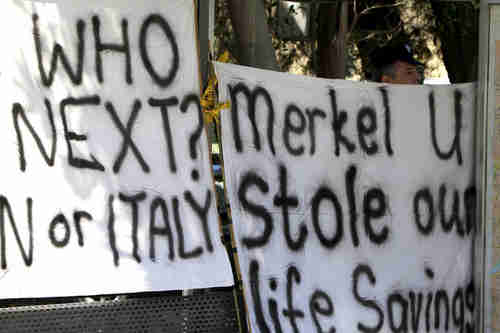 |
In a stunning rebuke to European politicians, including Cyprus's newly elected president Nicos Anastasiades, Cyprus's parliament rejected the terms of the proposed European bailout that would have levied a 6.7% tax on all bank accounts with less than 100,000 euros, and 9.9% on amounts above 100,000 euros. 36 members voted against the plan, while 18 abstained. Meanwhile, politicians have been pointing fingers at each other, each claiming that it was somebody else's dumb idea to confiscate the savings of widows and orphans.
Although it's still possible that the Europeans will cave and the ECB will bail out Cyprus completely, a number of commentators are saying that the most likely scenario now is that Cyprus will leave the euro and -- get this -- might possibly replace it with the Russian ruble as its official currency. The reason is that Cyprus's economy is already overwhelmingly dominated by investments (and money laundering) by Russian oligarchs.
The big jewel in play here is the offshore oil and gas fields potentially worth many billions of dollars in the years to come. Russia would like to have rights to those fields, and the Europeans may give Cyprus a complete bailout in return for European control of the fields. Reuters and FT Brussels Blog
California's tax authorities have announced that they're re-interpreting a five-year-old tax law which gives a break for small businesses that's given a lot of credit for promoting job growth and investment, especially in high tech. California plans to send out tax bills to companies that took advantage of the law, and demand $120 million in retroactive tax payments. Opponents are saying that the re-interpretation is confiscation, like the confiscation of bank savings accounts in Cyprus. Fox News
It is "highly probable" that chemical weapons have been used in Syria. According to Syria's state-run news service Sana:
"Terrorists launched a missile containing chemical products into the region of Khan al-Assal in the province of Aleppo, killing 15 people, mainly civilians."
There are a couple of problems with this claim, according to analysts. First, the regime of Syria's president Bashar al-Assad has lied frequently, blaming "terrorists" for its own actions, namely firing missiles into homes and schools, massacring innocent mothers and children, with the full support of the Russians. So it looks like something we've seen dozens of times since this conflict began: al-Assad makes a bloody attack on innocent civilians, this time using chemical weapons, and then blames it on "terrorists."
The second problem, according to analysts I heard, is that launching a chemical weapons missile requires sophistication that the rebels don't have, and that the regime does have.
The regime's use of chemical weapons comes a day after the regime's warplanes attacked targets in Lebanon, threatening to expand the war outside of Syria.
Initially, the Obama administration made a statement that there was no evidence that the chemical weapons allegations were true, but the chairman of the of the House Intelligence Committee says that there is a "high probability" that chemical weapons were used.
The administration will now face a credibility test. President Obama has said unequivocally in the past that the use of chemical weapons would be a "red line" that, if crossed, would bring U.S. forces into the war. If the chemical weapons charges are confirmed, that statement will be tested. CNN
(Comments: For reader comments, questions and discussion, see the 20-Mar-13 World View -- Syria crosses a 'red line' with chemical weapons thread of the Generational Dynamics forum. Comments may be
posted anonymously.)
(20-Mar-2013)
Permanent Link
Receive daily World View columns by e-mail
Donate to Generational Dynamics via PayPal
Syria's conflict may be spreading into Lebanon
This morning's key headlines from GenerationalDynamics.com
Cyprus' bailout crisis deepened on Monday, as the Parliament put off for the second day a vote on whether to accept the European bailout terms. The terms are that the European Central Bank would supply a 10 billion euro loan, but require that Cyprus come up with 5.8 billion euros by "taxing" its savings bank depositors 6.7% for accounts under 100,000 euros, and 9.9% for larger accounts.
Cyprus has announced that its banks will remained closed at least until Thursday, in order to prevent bank runs while the government tries to resolve the crisis.
A vote is now scheduled for Tuesday evening. If the bailout terms are rejected, then the ECB will cut off all liquidity to Cyprus, forcing it to leave the euro currency, according to a number of analysts.
The bailout terms have caused worldwide anxiety over the banking system. Reading various comments on blogs and in media interviews, I've read and heard things like the following:
There has been pressure on the Europeans to soften the terms, but on Monday they told Cyprus that the terms hadn't changed, but they suggested that it's not necessary to raise the 5.8 billion euros from small bank depositors.
According to one report I heard, there is a proposal to increase the tax on accounts above 500,000 euros to 15%, and to remove the tax from accounts under 100,000 euros. Bloomberg
Russia's president Vladimir Putin is calling the bailout plan "unfair, professional and dangerous." Prime minister Dmitry Medvedev said the decision was strange and controversial, and that it "looks like a forfeiture of other people’s money." According to various reports, Russian banks and private individuals have some $30-40 billion in Cyprus banks, and so they will lose $3-4 billion -- assuming that the tax isn't is raised to 15% as some have proposed.
If the tax on Russian depositors is increased to 15%, it will cause a real crisis in Russia, according to some commentators.
Another commentator suggested that a more dangerous scenario for Russia would be if Cyprus enacts a moratorium on loan repayments to Russia. This would cost Russia tens of billions of dollars.
There are various unconfirmed reports floating around that the Russians were tipped off in advance of the bailout plan, and that Putin and some of his advisors transferred funds out of the Cyprus in the days before the announcement. Once again, these reports are unconfirmed. Russia Today and Russia Today and Business Insider
Long-time will recall that several years ago I proposed the "Kick the Can Theory" with regard to the financial debt crisis in Greece. The theory said that the Europeans will never take any action until the very last minutes, and then they'll only "kick the can down the road," meaning that they'll do the minimum necessary to solve the immediate problem, leaving the underlying causes unchanged, only to get worse. Thus, each crisis would be worse than the last one.
The Kick the Can Theory has been correct every time with respect to the Greek crisis, but it seemed that the Europeans violate the rules when it came to the Cyprus bailout.
The "pure" kick the can decision would have been for the ECB to loan the entire bailout amount to Cyprus, so that no depositors would be hurt. However, the Germans and others objected to this, because they didn't want to bail out Russian oligarchs.
So the ECB refused the "pure" kick the can decision, and so Cyprus had to come up with billions of euros.
Contrary to initial assumptions, it wasn't the Europeans or the Germans who insisted that Cyprus "tax" small savings accounts. It was the Cyprus government that made that decision. Cyprus was left to find a can-kicking solution on its own -- either tax small depositors or tax the Russians. Either way, they were going to be blamed. They tried to take a middle road and tax both, but now they're getting dumped on from both sides.
The experience this weekend shows what happens when the Kick the Can Theory is violated. There was no way to "kick the can down the road," since the Europeans have reached the end of their patience in bailing countries out.
There are now crisis talks going on across Europe to find a can-kicking solution.
One possibility is that Russia may bail Cyprus out in return for exclusive contracts to Cyprus's rich offshore oil and natural gas fields.
Another possibility, already suggested, is that small depositors would be protected, and the entire burden would be on large depositors, including Russians and other foreign depositors.
Another possibility, also already mentioned, is that the ECB back-pedal and agree to provide the entire 17 billion euro bailout loan. This would deal a fatal blow to austerity drives in Greece, Italy, Spain and other countries.
Another possibility is that Cyprus can leave the eurozone, and return to its old currency, the pound, which was their currency until they adopted the euro in 2008.
Each of these solutions has serious obstacles. What's interesting is that the Europeans are "running out of road," in the sense that you can only kick the can down the road so far.
The next 24-48 hours are crucial, and a compromise of some sort will be reached. However, that won't end the crisis. Europe has crossed a red line, and everyone from widows and orphans to oligarchs are now fully aware that their bank accounts are not safe.
As I've written many times, Europe is trending into a deflationary spiral, and Generational Dynamics predicts that there will be a major global panic and financial crisis, worse than the panic and crash of 1929, and it will be triggered by something. Perhaps the Cyprus decision will be the trigger, perhaps something else will. But the Cyprus decision has already raised anxiety among savers around the world, and moved the world one step closer to full scale panic.
A major Chinese company, the world's biggest maker of solar panels, is declaring technical bankruptcy and going into default, after failing on Friday to repay $541 million in debt repayments. The company, Suntech Power Holdings Co. Ltd. (STP), had been supported by China's state organizations. As I've said in the past, as bad as America's economy is, China's is much worse, with huge ghost cities and massive air and water pollution. Bloomberg and Zero Hedge
Jets and helicopters from the regime of Syria's president Bashar al-Assad fired rockets into targets inside Lebanon on Monday. The al-Assad regime has threatened to take the war into Lebanon, targeting "concentrations of armed gangs inside Lebanese territory in order to prevent them from crossing into Syrian territory." The Mideast as a whole continues step by step to become destabilized, and the Syrian conflict continues to turn into a regional war between Sunni and Shia Muslims. Daily Star (Lebanon)
(Comments: For reader comments, questions and discussion, see the 19-Mar-13 World View -- Cyprus banks remain closed as bailout crisis continues thread of the Generational Dynamics forum. Comments may be
posted anonymously.)
(19-Mar-2013)
Permanent Link
Receive daily World View columns by e-mail
Donate to Generational Dynamics via PayPal
Israel's government turns hardline pro-settlement on eve of Obama's visit
This morning's key headlines from GenerationalDynamics.com
 |
It's now become clear that European financial negotiators vastly underestimated the widespread furious public reaction to the terms of the bailout of Cyprus's banks that we reported yesterday.
Cyprus President Nicos Anastasiades went on nationwide television on Sunday and called it the greatest crisis since the 1974 war with Turkey. It was just a month ago that Anastasiades won the election to the presidency, and one of his promises was that bank deposits would be completely safe. Now he has to explain that he has no choice but to renege on that promise or face collapse of the banking system and the economy:
"The first option would have led to a disorderly default as a result of the decision by the European Central Bank for the immediate stop of the emergency liquidity assistance to the two major Cypriot banks.The second is the option of a very difficult but controlled and manageable situation that will eventually lead to the stabilization of the economy and to a rebound."
Perhaps the biggest shock of all to the public is that small savings accounts were reduced by 6.7%. Accounts with totals up to 100,000 euros are supposed to be fully insured in many countries in the euro zone, including Cyprus, just as accounts in American banks are supposed to be insured up to $250,000. But now the safety deposit insurance throughout Europe has been thrown into question, as it's clear that a government can revoke the insurance on a moment's notice.
Monday is a long-scheduled bank holiday in Cyprus, and the Parliament will debate on Monday whether to even accept the bailout on those terms. If not, then Cyprus' banking system will collapse, unless some other solution can be found.
Banks will be closed on Monday, and are scheduled to reopen on Tuesday. It's expected that when the banks reopen, there will bank runs that will deplete all the banks of cash. For that reason, Cyprus is considering keeping the banks closed on Tuesday as well. Cyprus Mail and Kathimerini and Cyprus Central Bank
Opposition political parties are blaming the European Union, especially Germany, for "vindictive and neo-colonial" practices that led to the current crisis. According to the leader of the communist AKEL party: "They are attempting to impose their political options on Cyprus, leading out country and people to conditions that are similar to those in other countries of the European south."
Russians are unhappy at being made scapegoats for the Cyprus crisis. A lot of what happened can be attributed to German animosity towards Russia, particularly the fact that German officials refused to bail out Russian oligarchs who had "dirty money" in Cyprus banks. However, not all Russian money is "dirty," as there are plenty of legitimate businesses, especially in the energy industry, that have put money into Cyprus.
Some Russian businessmen are in a panic. Russian businesses and individuals have deposited tens of billions of dollars in Cyprus banks, and they are going to lose 10% of those deposits when the banks reopen. For that reason, some Europeans are hoping that Cyprus will reject the bailout, and get another bailout from Russia. Cyprus Mail and AFP
After six weeks of tough negotiations, following the election where he didn't do as well as he had hoped, Israel's prime minister Benjamin Netanyahu has assembled a new governing coalition, just two days before President Barack Obama is scheduled to visit. However, much to Obama's likely chagrin, most of the key positions in the government will be filled by pro-settlement hardliners. In particular, the housing ministry has been given to Uri Ariel, an ultra-nationalist settler in the Jewish Home party, which completely opposes a Palestinian state. Even the new Defense Minister, Moshe “Boogie” Yaalon, is a military veteran and staunch rightwinger known for his support of the Jewish settler movement. Israel's aggressive settlement policy has been a major source of world criticism for Israel, and has substantially heightened tensions with the Palestinians. President Obama has urged Israel to halt West Bank settlement building. Arab News / AFP and Jerusalem Post
(Comments: For reader comments, questions and discussion, see the 18-Mar-13 World View -- Germany and Russia get blamed for the Cyprus crisis thread of the Generational Dynamics forum. Comments may be
posted anonymously.)
(18-Mar-2013)
Permanent Link
Receive daily World View columns by e-mail
Donate to Generational Dynamics via PayPal
Will politicians convince everyone that there's no worry?
 |
Shocked and angry residents of Cyprus on Saturday morning rushed to their banks and ATMs to withdraw their savings, but it was too late. The ones who had been lucky enough or smart enough or frightened enough to have withdrawn their money earlier in the week lost nothing, but the ones who believed the Cypriot and European politicians who said that all bank deposits are safe were screwed.
In the wee hours of the night, the Eurogroup of eurozone finance ministers agreed to bail out Cyprus, after a year of negotiations. Cyprus needed a 17 billion euro bailout loan for its banking system, but the Eurogroup was only willing to come up with about 10 billion euros, so the difference had to be made up by penalizing depositors: 9.9% on deposits above 100,000 euros, and 6.75% on smaller deposits.
There were harsh disagreements in the euro zone whether Cyprus should be bailed out at all. The problem is that Cyprus's banks have been used as vehicles for laundering billions of dollars by Russian oligarchs who don't want to pay Russia's taxes. Thus, bailing out Cyprus's banks would be bailing out Russia's oligarchs. Many MPs in Germany's Bundestag refused to consider a bailout. The final settlement punishes ordinary Cyprus citizens as well as the Russian oligarchs.
The fear is that now that a precedent has been set, the same method will be used with other countries, including Spain, Portugal and Greece. It might be used again in Cyprus, if another bailout is needed. Politicians are insisting that this was a one-time situation that will never happen again, but those are the same politicians that promised that depositors' life savings would be protected. They're also the same politicians that said that each bailout of Greece and each new austerity plan in the last three years would be the last.
Could the same thing happen in the United States? Think back over the last six years, and think about all the "things that could never happen here" that now have happened. And we have a President whose announced intention last week is to spend as many trillions of dollars as he can.
There actually have been bank panics in recent times. In 2007, there was a bank run in California, and another bank run in Britain. (See "Anxious investors mob Countrywide Bank to withdraw their deposits." and "Panic appears to be spreading in Britain, as depositors mob Northern Rock" from 2007.)
In those cases, politicians quelled the growing panic by announcing that all bank deposits would be safe, and then by following up with policies. Since then, North Americans and Europeans have felt confident that their life savings were safe, and there haven't been any major bank runs since 2007.
Politicians here and in Europe are now going to be scrambling to make new promises and pronouncements that everyone's bank deposits are safe. It remains to be seen whether those promises will be believed. Guardian (London) and Kathimerini
(Comments: For reader comments, questions and discussion, see the 17-Mar-13 World View -- Cyprus bailout threatens international bank runs thread of the Generational Dynamics forum. Comments may be
posted anonymously.)
(17-Mar-2013)
Permanent Link
Receive daily World View columns by e-mail
Donate to Generational Dynamics via PayPal
EU split on whether to supply arms to Syria's rebels
This morning's key headlines from GenerationalDynamics.com
 |
The Senate's Permanent Subcommittee on Investigations grilled the JPMorgan Chase execs on Friday. Most Senate committee hearings are nothing but photo ops for the Senators who sit there and give campaign speeches for the folks back home, but this hearing was different. Only two Senators asked the questions -- Republican Senator John McCain and Democratic Senator Carl Levin -- both from the Silent Generation of World War II survivors, the generation that still has ethics and morals.
The charges are that JPMorgan's London office lost $6.2 billion, and then the NY headquarters lied to investors about it. Here are some of the things that I heard:
Carl Levin really did a sensational job of grilling the execs, especially former CFO Doug Braunstein, and forcing him to admit contradictions that showed he had lied. Levin had really done his homework, studying all the detailed evidence in advance, and quickly trapped Braunstein time and time again in contradictions or half-truths. This is something the Gen-X prosecutors don't do, not because they're incapable, but because they refuse to investigate and prosecute other Gen-Xers.
In one particularly hilarious moment, McCain asked Braunstein whether anyone had been punished. Braunstein indignantly said that people had been fired. Those were traders -- were the managers punished? Yes, they had their salaries cut. Was your salary cut? Errrr, yes, by 50%. How much is that in dollars? Errr, well, my salary used to be $10 million, now it's only $5 million. McCain displayed an expression of revulsion.
The humiliation of Braunstein was fun, but the most pathetic finger-pointing came from Ina Drew, former Chief Investment Officer (CIO). She started her testimony by whining about how tough her job was to run a large organization, while she was also a mother and took care of her kids. Levin asked her about the new VAR financial models that the London traders used to hid their losses. The new models were designed by Patrick Hagan, and they wasn't tested or questioned by the tradrers. Here's my transcription:
LEVIN: :"The VAR model - the new one - depended on analyzing a daily stream of new trading data. Instead of constructing an automated data base, that automatically would feed the trading data into a VAR model, Mr. [Patrick] Hagan, the model designer, PhD, was stuck with having to manually enter the trading data every night, using spreadsheets that had calculation and formula errors. In other words, the new key VAR model, for the CIO's $350 billion portfolio, including the synthetic credit portfolio, was being run manually, using error prone spreadsheets with operational flaws.Ms. Drew, why did the bank model review that approved the VAR say -- why did they approve the VAR, knowing that there were problems, and then allow it to operate in such a shoddy fashion?"
DREW: "It's very disappointing. I have no idea. the risk modeling group is an independent group staffed by very well trained and educated PhDs, who run the models, and certainly very disapppointed that it was not reviewed properly, and delivered to me in poor form."
LEVIN: "Did Mr. Hagan work for your group?"
DREW: "He did, in London."
Ina Drew kept using that high-pitched voice that women use all the time when they want to paint themselves as innocent victims of some man. So it's well to remember that this was a top-level manager heading a big organization, making millions of dollars in salary. She was no innocent victim, despite her estrogen-based whining.
What we're seeing here is exactly the same pattern that I've described and documented many times as causing the financial crisis:
I've been reporting on this pattern for years. For example, this is what happened in the Libor fraud cases at Barclays, RBS and other banks. Or perhaps, Dear Reader, you happened to see the report on 60 Minutes a couple of weeks ago, where a Framingham, Mass., pharmaceutical supply house ignored government regulations, and shipped medical products that sickened and killed hundreds of people from meningitis.
The situation at JPMorgan Chase did not occur 8 years ago. It occurred last year, in 2012. What we see again is what I call the "Metastasis of Corruption," where the illegal activities begin with a few Gen-Xers, and then spread to wherever there's money or political power, like a cancer that spreads to wherever there's rich tissue. This is why I keep telling you, Dear Reader, that the same people are in the same jobs, or in Washington or on Wall Street, still finding new ways to defraud you, so wrapped up in their own lies that they're no longer even capable of distinguishing truth from fiction. Bloomberg and Senate Investigation Committee and CBS 60 Minutes
In another example of surging fraud, a study of 2,047 papers that had been published in biomedical journals and later retracted, the researchers found that the retractions were not due to simple errors, but in 67% of the cases were due to misconduct -- fraud, suspected fraud, duplicate publication, and plagiarism. The number of retractions began to skyrocket in 2005, which is exactly the same time that corruption and fraud in financial institutions began to skyrocket.
Once again, I've seen this kind of fraud and corruption personally in the computer industry, and I've reported on in financial services and in media and in Washington many, many times. Nothing like this was true in the 1990s, but today there is literally no aspect of life in America anymore that isn't polluted with fraud and corruption. The only "good news" is that the same thing is true in China, and probably worse. Proceedings of National Academy of Sciences and newswise.com
Because of threats by North Korea and Iran to attack the United States with long-range missiles, the Dept. of Defense announced on Friday that the U.S. will deploy additional ground-based missile interceptors (GMIs) on the West Coast. In response to a criticism that such interceptors have not been proven to work, Secretary of Defense Chuck Hagel said:
"We certainly will not go forward with the additional 14 interceptors until we are sure that we have the complete confidence that we will need. But the American people should be assured that our interceptors are effective."
The deployment will be completed by 2017. An early warning system will also be deployed in Japan.
I'm going to guess (or perhaps hope) that these interceptors will also be effective against the greater threat of Chinese missiles. Washington Post
France and Britain are advocating an end to the European Union embargo on arms to Syria, and supplying arms to the anti-regime rebels. The proposal generated heated discussion over fears that any arms supplied to the rebels would fall into the hand of al-Qaeda linked terrorists. If no agreement can be reached by the EU, then France and Britain may supply arms on their own. BBC
(Comments: For reader comments, questions and discussion, see the 16-Mar-13 World View -- U.S. will deploy missile interceptors on West Coast thread of the Generational Dynamics forum. Comments may be
posted anonymously.)
(16-Mar-2013)
Permanent Link
Receive daily World View columns by e-mail
Donate to Generational Dynamics via PayPal
As Egypt deteriorates, what will the army do?
This morning's key headlines from GenerationalDynamics.com
 |
Argentina's President Cristina Fernández de Kirchner never got along very well with Jorge Mario Bergoglio when he was the Buenos Aires Archbishop. They clashed in 2010 when Bergoglio opposed Kirchner's bill to allow gay marriages, saying:
"[The gay marriage bill is a] plan to destroy God’s plan. This is no mere legislative bill. It is a move by the father of lies to confuse and deceive the children of God. If approved, this law would be a real and dire anthropological throwback."
Kirchner said Bergoglio’s comments were "really reminiscent of the times of the Inquisition."
But that was just the latest skirmish in a long-running battle with the government to re-litigate alleged repression and torture by the Catholic Church during the military government from 1976-83.
However, now that Bergoglio has become Pope Francis, Kirchner is changing her attitude towards him, asking him to intervene in the disagreement between the UK and Argentina over the Falkland/Malvines islands. His frequently stated views in the past are that the islands belong to Argentina. In a memorial mass last year marking 30 years since the 1982 war between the two countries over the islands, he said:
"We come to pray for those who have fallen, sons of the homeland who set out to defend their mother, the homeland, to claim the country that is theirs and they were usurped."
However, it's expected that Pope Francis will completely avoid the issue. It was Pope Alexander VI who divided the New World between Portugal and Spain in the 15th century, but there are no recent precedents for a pope becoming involved in a territorial dispute and experts believe it is unlikely he would wish – or have the time – to become embroiled in the matter. NBC Latino and Buenos Aires Herald and Guardian (London)
Venezuela's acting president, Nicolás Maduro, is suggesting that Hugo Chávez may have had a hand in the selection of Jorge Mario Bergoglio of Argentina as the new Pope. According to Maduro:
"We know that our commander ascended to the heights and is face-to-face with Christ. Something influenced the choice of a South American pope, someone new arrived at Christ's side and said to him: 'Well, it seems to us South America's time has come.'"He (Chávez) may also call a constitutional assembly in Heaven at any moment to change the (Catholic) church on Earth so the people, the pure people of Christ, may govern the world."
Last week, Maduro announced an investigation into charges that "imperial forces," particularly from the United States, conspired to kill Chávez by injecting him with something that gave him cancer. Reuters
 |
Venezuela's acting president, Nicolás Maduro, said that it is highly unlikely that the body of Hugo Chávez will be embalmed, after all. The bodies of dictators Lenin, Ho Chi Minh and Mao Zedong were all embalmed, and are on permanent display for posterity. But Maduro said that the decision to embalm Chávez's body was not made in time, and now it probably can no longer be embalmed. BBC
Egypt is getting out of control: The police are on strike in a number of cities, the civil disobedience in Port Said is in its fourth week, hooligans are attacking and ransacking public buildings, and angry youth are clashing with anti-riot police on daily basis. The government has been unable to end chronic fuel shortages while large parts of Sinai suffer from lawlessness. The economy is on the brink of collapse and the stock market has been losing billions of pounds every day. The economy is suffering and negotiations with the IMF over a $4.8 billion loan are faltering. Everyday there is death and mayhem somewhere in the country. And now a high court has ordered the suspension of parliamentary elections, throwing government processes into total chaos. The time may be coming close when the army will take over. Arab News
(Comments: For reader comments, questions and discussion, see the 15-Mar-13 World View -- Pope Francis may side with Argentina in Falklands dispute with Britain thread of the Generational Dynamics forum. Comments may be
posted anonymously.)
(15-Mar-2013)
Permanent Link
Receive daily World View columns by e-mail
Donate to Generational Dynamics via PayPal
Terrorists disguised as cricketers kill 5 Indian soldiers in Kashmir
This morning's key headlines from GenerationalDynamics.com
 |
Saudi Arabia is considering the abolishment of beheading for capital punishment in favor of firing squads, because there are shortages of government swordsmen to do the job. Rape, murder, apostasy, armed robbery and drug trafficking are all punishable by death under Saudi law. About 70 people were put to death by beheading in 2012. There has been worldwide outrage of Saudi Arabia's beheading program, and it reached a peak last week after the beheading of a girl who, in 2005, at age 17, came to Saudi Arabia as a maid, and plotted and killed an infant by suffocating him to death one week later. Al-Ahram (Cairo)
Two terrorists disguised as cricket players got out of a car, walked across a playground for a school adjacent to a paramilitary camp in the India-governed side of Kashmir, shot dead a sentry, and fired grenades indiscriminately, killing 5 soldiers and wounding three civilians. The two terrorists were killed by Indian soldiers. Kashmir was the epicenter of the massive genocidal war that followed Partition, the partitioning of the Indian subcontinent into India and Pakistan in 1947. Pakistan and India each control a portion of Kashmir, with the two sides separated by a border called the "Line of Control" (LoC). Kashmir has been the site of repeated clashes between Pakistan and India since 1947, and may well be the epicenter of the next massive genocidal war between the two countries. India blamed the Pakistan terrorist group Lashkar-e-Toiba (LeT) for Wednesday's attack, but Pakistan rejected the charge that any Pakistanis were involved in the attack. Hizbul Mujahideen, an Indian Islamist terrorist group, has claimed responsibility for the attack. Times of India and Pakistan Observer
The generational change in China's leadership, as 59-year-old Xi Jinping takes over as president from 70-year-old Hu Jintao on Thursday, marks a historic change in attitudes at the top. Hu Jintao, it seemed to me, fit the profile of a survivor of the last crisis war (like our Silent Generation) by seeking to mediate disputes. Having grown up during Mao's bloody Communist Revolution, he understands how dangerous it is to provoke another war, and doesn't want to see anything like that happen again.
Xi Jinping never suffered the horrors of Mao's war, and doesn't understand the dangers. He's launched a series of "The China Dream" speeches, in which he calls for China to shed its past as a secondary player, and become the world's top military and economic power. He's visiting Chinese military bases and telling the troops to be ready for war at any time. He's personally taking charge of policy in the East and South China Seas, and has vowed that China will take every step necessary to gain control of these regions, including areas that have been owned by other countries for centuries.
So now we have a President in Beijing who says that there's no problem with preparing rapidly for war against the United States, and we have a President in Washington whose stated intention on Wednesday is to have the government spend as many trillions of dollars as possible. These two world leaders are racing to see who can be the first to create a catastrophe. It'll be interesting to see who wins, I guess. WSJ and China Daily
(Comments: For reader comments, questions and discussion, see the 14-Mar-13 World View -- Xi Jinping envisions 'China's Dream' - world economic and military domination thread of the Generational Dynamics forum. Comments may be
posted anonymously.)
(14-Mar-2013)
Permanent Link
Receive daily World View columns by e-mail
Donate to Generational Dynamics via PayPal
Venezuela to investigate America's 'cancer poisoning' of Chavez
This morning's key headlines from GenerationalDynamics.com
 |
Britain's prime minister David Cameron said on Tuesday that he might break with the rest of the European Union and supply weapons to anti-regime rebels in Syria. This is coming in response to continuing atrocities by the regime of Syria's president Bashar al-Assad, targeting innocent women and children in their homes, beds and schools, using weapons supplied by the Russians and the Iranians. All 27 member states of the European Union have agreed to an arms embargo with respect to Syria, but Britain recently pushed for an won an agreement to amend the embargo to supply non-lethal equipment such as body armor and armored vehicles. But now Cameron wants to go farther, and hopes that Britain and the other EU members will agree. "But if we can't, then it's not out of the question we might have to do things in our own way. It's possible." The Germans oppose such a move, for fear that it would spread conflict in the region. Reuters
For years, everybody "knew" that it was Chinese hackers that were hacking into the networks of thousands of American companies and stealing information. But the Chinese just kept denying culpability, and no one could say for sure that the Chinese government was involved. That changed with the report published last month by Mandiant. (See "20-Feb-13 World View -- New report reveals massive cyber war attack by China's army") That report provides forensic proof that China's People's Liberation Army (PLA) has been systematically conducting cyberwar against American government and corporate organizations. In particular, the PLA's "Unit 61398," working out of a building in Shanghai, gains control of a company's network, retains control in stealth mode, and downloads all the data in the network over a period of months, sometimes terabytes of data.
The nation of Georgia decided to counter-attack when it discovered that the networks of its ministries, parliament and banks had been compromised, and had downloaded many files. They tricked the hackers into downloading a poisoned file that installed malware on the hackers' computers. The Georgia researchers then were able to download data from ther hackers' computers, and prove that that the attack came from Russian security agencies.
A lot of U.S. companies would like to get similar revenge against Chinese hackers. They're tired of having to spend billions of dollars trying to protect their networks, and still the Chinese hackers get away scot free, available to hack into other companies' networks and steal data. And there's a new phrase coming into vogue -- "hacking back" -- which means hacking into an attacker's network either to steal data or to do actual damage.
However, there are two problems with a hackback strategy:
The Mandiant report has hardened attitudes on this issue. The Chinese will continue to express indignant outrage, as they do whenever they're questioned about their rapidly increasing military belligerence anywhere, but they'll also continue and even escalate cyberattacks on Western governments and companies. NPR and Georgia Government Data Exchange Agency (PDF) and Steptoe Cyberblog
Cyberwar has entered the sequestration debate arena.
Attempts to protect America against cyberattacks is being compromised by sequestration, according to Senate testimony on Tuesday by National Intelligence Director James Clapper.
"Our cyber efforts will be impacted. This is an area where, you all know, we need to keep ahead of rapid technology advances to maintain and increase access to adversaries, as well as provide warning of a cyber attack against the U.S."
However, others say that President Barack Obama in August 2011 rejected a series of tough actions against China, including counter-cyber attacks and economic sanctions, for Beijing’s aggressive campaign of cyber espionage against the U.S. government and private businesses networks.
In other news, the pigs running Washington have almost reached a point of total chaos and incoherence. I just hope we survive. VOA and Free Beacon
Venezuela's acting president Nicolás Maduro announced on Tuesday that foreign scientists will be invited to join a government commission to investigate with America "poisoned" Hugo Chávez, causing him to develop cancer and die from it.
"We will seek the truth. We have the intuition that our commander Chávez was poisoned by dark forces that wanted him out of the way."
The accusation has been derided by critics of the government, who say that it's a typical Chávez-style conspiracy theory intended to feed fears of "imperialist" threats. Al-Jazeera
(Comments: For reader comments, questions and discussion, see the 13-Mar-13 World View -- American businesses debate cyber counter-attack on China thread of the Generational Dynamics forum. Comments may be
posted anonymously.)
(13-Mar-2013)
Permanent Link
Receive daily World View columns by e-mail
Donate to Generational Dynamics via PayPal
Chavez's death may cost Russia tens of billions of dollars
This morning's key headlines from GenerationalDynamics.com
 |
Long-time readers are aware that on a dozen or so occasions, I've transcribed the words of several of the most prestigious financiers appearing CNBC and Bloomberg TV, and pointed to specific lies. (See "8-Feb-13 World View -- Libor-rigging scandal and lying on Wall Street" from last month.)
In most cases, the lies are about the S&P 500 price/earnings ratio, also called "valuations." In order to encourage investors to buy more stocks, they openly lie about stock valuations, often claiming that stock valuations are at historic lows, whereas in fact they've been at historic highs continuously since 1995. By the Law of Mean Reversion, stock prices are going to fall to below Dow 3000, and stay there well into the 2020s.
The Wall Street Journal addressed this situation on Monday:
"Stock Market's Rosy View of Earnings ...That earnings came in a few percentage points higher than analysts had expected also isn't as impressive as it seems. In a typical quarter, more than 60% of companies "beat" the consensus, a ratio of about 3 to 1 over those that "miss."
What may be more significant is the guidance that some companies gave about the current quarter. According to Thomson Reuters, the ratio of negative guidance to positive was an unusually high 4.1 to 1. As a result, earnings growth for the first quarter is expected at just 1.4%. That would be the second-weakest performance since 2009.
Earnings can be volatile, even for the entire market. That is why revenue deserves more attention than it sometimes gets—and it provides scant reassurance.
After falling slightly in the third quarter, the S&P 500's revenue grew by an estimated 3.7% in the fourth quarter and is expected to grow by just 1% in the first quarter. The implication is that much of recent earnings growth relies on expanding profit margins. Those already are above historical averages, though. The S&P 500's price multiple of trailing 12-month earnings is nearly 18. That multiple would rise into the low-20s if margins reverted to past form.
Investors seem unconcerned, but they are paying prices today that assume a lot more great quarters."
In other words:
The recent rise in Wall Street prices is extremely alarming, because they've been rising rapidly since the December fiscal cliff and sequester crisis was postponed, apparently convincing investors that anyone who expressed any concern was completely full of crap. The rise may even be accelerating to parabolic levels, indicating that the hard crash, which must occur sooner or later, may be close. WSJ
Researchers at Cambridge University's Psychometrics Centre have developed computer algorithms that gather a great deal of personal and information from Facebook "likes" from people's profiles, including the following:
A lot of the data is inferred. For example, the algorithms infer whether the person is gay from his "likes" for music and TV shows. Cambridge University
The death of Venezuelan President Hugo Chávez has put into jeopardy tens of billions of dollars in contracts that Russians had signed with the purpose of giving financial support to socialist anti-American leader Chávez. Chávez was personally behind all the major projects with Russia in energy, transportation, weapons purchases and banking. But now Russian officials fear that the new president will turn to China for military and technical cooperation, or even the United States for other investments. Venezuela is deeply in debt to Russia, and with Chávez gone, much of that debt may have to be written off. The first signs of trouble have already occurred: Although Russian president Vladimir Putin called Chávez a "big friend of Russia," Putin only sent a low-level delegation to Chávez's funeral, headed by a businessman, Igor Sechin. And on his way to the funeral, Sechin stopped in Houston, Texas, in order to convince U.S. investors to financially back Russia's energy firm Rosneft. What irks Putin most, however, was Chávez’s natural ability to connect with his electorate, while no amount of political "technologies" could check the alienation of Russia’s scandalously corrupt elites from the "masses." Moscow Times and Jamestown
As we reported last month, dozens of Kenya witnesses who were expected to testify against Kenyan leaders being charged with crimes against humanity have been disappearing and are presumed dead. Three Kenya officials, including the president-elect Uhuru Kenyatta, are expected to go to trial this summer at the International Criminal Court (ICC) in the Hague. The charges stem from the bloodbath that occurred after the December 2007 elections, where death squads that killed more than 1200 people, and caused many atrocities, including torture, rapes, mutilations, and murder. But now the ICC has dropped charges against one of the officials, retired Public Service head Francis Muthaura, saying that key witnesses had either been killed, died or bribed or were too afraid to testify. The prosecutor also accused Kenya of being uncooperative, refusing to provide required witnesses and documents. It's not known whether the charges against Kenyatta will have to be dropped as well.
The ICC charges appear to have done Kenya a favor by reducing the chances of a new ethnic bloodbath following the current elections. Ethnic battles in Kenya stem from conflicts over land, as populations for different ethnic groups continually grow and occupy each other's farmland and grazing fields, and land is usually the biggest issue in elections. But in this election, the land issue was in second place behind the ICC charges issue. The ICC charges polarized the traditional supporters of each candidate, but the middle ground swung over to Kenyatta's side, since many Kenyans view the ICC as favoring the West and biased against Africans. The Nation (Kenya) and Daily Monitor (Uganda)
(Comments: For reader comments, questions and discussion, see the 12-Mar-13 World View -- Stock market share prices may be going parabolic thread of the Generational Dynamics forum. Comments may be
posted anonymously.)
(12-Mar-2013)
Permanent Link
Receive daily World View columns by e-mail
Donate to Generational Dynamics via PayPal
U.S. rift with Afghanistan throws withdrawal strategy into doubt
This morning's key headlines from GenerationalDynamics.com
 |
Iran's president Mahmoud Ahmadinejad has come under criticism in Iran because he hugged Hugo Chávez's mother, Elena Frias, to console her at Chávez's funeral on Friday. According to Islamic rules imposed by Iran's hardline Great Islamic Revolution survivors, unrelated men and women are not permitted to touch each other. Frias and Ahmadinejad held hands. She appeared to be leaning on Ahmadinejad and crying. In the bitter political climate of Iran, and the personal enmity between Ahmadinejad and Iran's Supreme Leader, Ayatollah Ali Khamenei, a photo of the embrace is taking on a life of its own.
The hug comes a couple of days after a number of controversial remarks by Ahmadinejad in his eulogy of Chávez, where he said:
"I have no doubt that he [Chávez] will return alongside Jesus Christ and the Mahdi [the Hidden Imam] to establish peace and justice in the world."
Ahmadinejad is a devout believer in the Mahdaviat -- the Shia Muslim belief that the Mahdi (or "the 12'th Imam" or "the Hidden Imam") is coming to save mankind. (See "28-Sep-12 World View -- At U.N., Abbas and Netanyahu are combative, while Ahmadinejad invokes the Mahdi") This belief is roughly equivalent to the Christian belief in the second coming of Christ, or the Buddhist belief in the Maitreya -- that a new Buddha is to appear on earth, and will achieve complete enlightenment. In 2011, Ahmadinejad used his belief in the Mahdi to justify disobeying the supreme leader Ayatollah Ali Khamenei. In Iran, Ahmadinejad frequently refers to the imminent return of the Hidden Imam for political purposes. Doing so again has drawn criticism from Tehran clerics. According to Ayatollah Khatami, "Logically, our president should express his condolences. But I think it is not appropriate to make it ideological." RFE/RL and RFE/RL
Both the Taliban and Afghanistan's president Hamid Karzai handed U.S. Defense Secretary Chuck Hagel stinging rebukes in the latter's first visit to Afghanistan, forcing the cancellation of a scheduled news conference by Karzai and Hagel.
The Taliban have claimed responsibility for two coordinated suicide bombings in the cities of Kabul and Khost on Saturday morning. A Taliban spokesman said that the Kabul attack was "a message to Hagel," to show that insurgents could strike even in one of the most heavily guarded parts of the capital, a neighborhood of government buildings and military bases with numerous checkpoints and blast walls.
However, the bitterly angry Karzai blamed the suicide bombings on America, in cooperation with the Taliban:
"Taliban are every day in talks with America, but in Kabul and Khost they set off bombs to show strength to America. They were in the service of the United States. They were in the service of the rhetoric of '2014'. It was meant to scare us, [to show] if they [foreign forces] are not here, 'we will not leave you alone'. ..Senior leaders of the Taliban and the Americans are engaged in talks in the Gulf state [of Qatar] on a daily basis."
I understand Karzai's convoluted logic to be the following: He's saying that America and the Taliban have been meeting secretly and conspiring against him (Karzai), and that the Taliban launched the suicide bombings so that American troops would have a reason to remain in Afghanistan beyond the planned withdrawal date next year.
Hagel denied collusion with the Taliban. The U.S. and NATO commander in Afghanistan, General Joseph Dunford, said:
"We have fought too hard over the past 12 years, we have shed too much blood over the past 12 years, we have done too much to help the Afghan security forces grow over the last 12 years to ever think that violence or instability would be to our advantage. ...I'll let others judge whether [Karzai's accusation] is particularly helpful or not at the political level."
Two weeks ago, we reported that an angry Hamid Karzai had ordered that U.S. special forces immediately end all operations in Wardak province, the province adjacent to the capital city Kabul. The reason for the demands was that Afghan forces under the command of the American special forces have been conducting tortures and murders in the region. Today (Monday) is the deadline for withdrawal, but the withdrawal is in limbo, suspended in negotiations. The Wardak situation was to be discussed between Hagel and Karzai, but the meeting was canceled.
President Obama initiated the "surge" into Afghanistan in 2009 with the intent of duplicating the success of President Bush's "surge" strategy into Iraq in 2007. However, as I've written several times in the past, the generational situation in Afghanistan is very different than in Iraq, and there are significant differences that will prevent the surge strategy from working there. (See "2-Sep-12 World View -- U.S. decision on Haqqani Network will affect Pakistan relations")
The Taliban are Sunni Pashtun militants. Even if they are inclined to live peacefully in Afghanistan after the Americans leave, the Sunni Pashtun Taliban just across the border in Pakistan will not let them.
From the point of view of Generational Dynamics, the biggest and most important difference between Iraq and Afghanistan is that Iraq's last generational crisis war was an external war (the Iran/Iraq war, 1980-88), while Afghanistan's last generational crisis war was a bloody, genocidal civil war (1991-96). That's why the "surge" could work in Iraq, but not in Afghanistan: No negotiations will heal the animosity between the Pashtuns and the Hazaras, who tortured, mutilated, raped and killed each other less than 20 years ago.
It appears increasingly to me that Hamid Karzai, who is a Pashtun himself, is in total denial about what's going to happen to him and to Afghanistan after the Americans pull out. Inter Press Services News Agency
Police arrested 27 Christians in Lahore, Pakistan, on Sunday, after mobs of Christian demonstrators battled police with stones, burnt tires, and smashed car windows. The Christians were protesting a horrific incident on Saturday, when hundreds of Muslims ransacked a Christian neighborhood in Lahore, and torched dozens of home, after hearing a report that a Christian man had committed blasphemy against Mohammed. Blasphemy has become the touchstone for generational attitudes and clashes in Pakistan that triggers the same kind of fury and violence that the Nazis had for the Jews. (See "3-Sep-12 World View -- Pakistan girl to be freed after bizarre twist in blasphemy case" from September of last year.) On Saturday, the mob was armed with hammers and steel rods and broke into Christian houses, ransacked two churches and burned Bibles and crosses. Accusations of blasphemy in Pakistan can prompt huge crowds to take the law into their own hands. Once an accusation is made it's extremely difficult to get it reversed, partly because law enforcement officials do not want to be seen as being soft on blasphemers. Speaking out against the blasphemy laws can put people in danger. Two prominent politicians were assassinated in 2011 for urging reform of the law. The killer of one of the politicians was hailed as a hero, and lawyers at his legal appearances showered him with rose petals. Independent (London) and The News International (Pakistan)
(Comments: For reader comments, questions and discussion, see the 11-Mar-13 World View -- Lahore Pakistan turns into a war zone between Muslims and Christians thread of the Generational Dynamics forum. Comments may be
posted anonymously.)
(11-Mar-2013)
Permanent Link
Receive daily World View columns by e-mail
Donate to Generational Dynamics via PayPal
New violence in an increasingly unstable Egypt and Lebanon
This morning's key headlines from GenerationalDynamics.com
 |
Kenya's election commission on Saturday announced that last week the deeply ethnically divided nation had elected Uhuru Kenyatta to be the new president by a narrow margin. Everyone's mind is focused on the fear of new violence similar to what happened after the December 27, 2007, elections, when inter-ethnic killings, rapes and amputations triggered by dissatisfaction with election results killed thousands of people. In his acceptance speech, Kenyatta said,
"I would especially like to acknowledge the Kenyans who lost their lives on the eve of the elections. They made the ultimate sacrifice, laying down their lives, in the name of democracy.To the families of those who lost their loved ones- I offer my sincere condolences and I assure you that I, and the people of Kenya are standing with you in prayer.
The incidents that took the lives of our officers are a reminder that security remains one of the biggest challenges to our nation. It is unacceptable to see the lives of Kenyans lost so senselessly.
As we move forward, I pledge to keep the issue of national security high on our agenda."
However, Raila Odinga, the candidate who lost the election, is not very happy with the results. In his speech, he listed "massive irregularities" in the voting process. Billions of dollars had been spent on new technology -- electronic voter identification kits and electronic voter tallying systems -- that all failed completely, forcing a count of the paper ballots, according to Odinga:
"Two days after the vote, the electronic tallying process was discarded and counting began afresh, manually. That too turned out to be flawed exercise in which, among other things, there was massive tampering with the IEBC voter register. ...Democracy is on trial in Kenya. It is clear that the process of electing a new set of leaders has been thwarted by another tainted election.""
Odinga's supporters believe that these failures were intentional sabotage to give his opponent a victory. However, Odinga also asked his supporters to remain peaceful:
"Any violence now could destroy this nation. ...Let the Supreme Court determine whether the result announced by the Independent Electoral and Boundaries Commission [IEBC] is lawful. We are confident the court will restore the faith of Kenyans in the democratic rule if law."
The Supreme Court will then have 14 days to hear the dispute and make a ruling whether to call for a new election. Odinga has made it clear that he expects to win a victory in court. Whichever way the court decision goes, it's going to make a lot of people very angry. Standard Media (Nairobi) and All Africa
The fact that Kenya is Barack Obama's ancestral homeland only complicates the diplomatic dilemma over the fact that winning candidate Uhuru Kenyatta is under indictment by the International Criminal Court (ICC) for crimes against humanity, stemming from his alleged involvement in the bloodbath that occurred after the December 2007 elections. He's accused of organizing and funding the death squads that killed more than 1200 people, and caused many atrocities. Kenyatta's trial is scheduled to begin this summer, and many people inside and outside of Kenya are wondering how he's going to be able to govern the nation while he's standing trial in the Hague.
Western nations, including the United States, are going to be reluctant to have ordinary diplomatic relations with a man who allegedly committed such these atrocities. In fact, prior to the election, the U.S. State Department’s top diplomat for Africa, Johnnie Carson, issued a thinly veiled warning to Kenyans that "choices have consequences."
This remark caused a huge outcry in Kenya, where the U.S. was accused of trying to interfere in Kenya's election process. As it turned out, Carson's remark proved to be a big benefit to Kenyatta. He portrayed himself as a victim of both the ICC and the United States, and was able to rally his supporters with those charges. In many ways, the election turned into a referendum on the ICC itself.
Kenya is extremely important to US interests, according to the Council on Foreign Relations:
"The fact that the U.S. Embassy in Nairobi is the largest in all of sub-Saharan Africa reflects the country’s centrality to a number of U.S. priorities. Kenya is a significant counterterrorism partner and an important point of military and humanitarian access in the region. Kenya has been a vital diplomatic partner in efforts to bring stability to Sudan and Somalia. The country is also a regional hub for U.S., international, and nongovernmental programs as well as the linchpin for private sector activity in East Africa. Trouble in Kenya can quickly infect neighboring countries, as the economic spillover effects of the current crisis have already made plain."
From the point of view of generational theory, Kenya's last generational crisis war was the Mau-Mau rebellion that climaxed in 1956, and so a new round of violence has a moderate probability of spiraling into a full-scale ethnic war. Toronto Star and Council on Foreign Relations (2008)
An Egyptian court on Saturday reaffirmed most of the death sentences for 21 Port Said soccer fans, triggering off new rounds of violence in Port Said and in Cairo.
Egypt's president Mohamed Morsi declared a state of emergency in Port Said in January after days of violent anti-police riots followed the sentencing by an Egyptian court of 21 people to death for participating in a riot in Port Said on February 2 of last year, where 74 young people were killed, and over 1,000 injured at a football (soccer) match. ( "27-Jan-13 World View -- Egypt in crisis after two days of violent clashes") Port Said residents claimed that the police had sided with the supporters of the visiting Cairo team, and were furious that the court had let the police go free. In this new ruling, two senior police commanders were giving prison sentences.
On Saturday, angry crowds targeted police offices and a police officers club in both Port Said and Cairo. Evidence presented at the trial showed that the police had locked the gates, allegedly to allow the Cairo supporters to kill as many Port Said supporters as possible.
Violence and instability have been increasing in Egypt since the election of Muslim Brotherhood president Mohamed Morsi. There are increasing fault lines between the government and the army, between the police and the army, between the Islamists and secularists, and between the Muslim Brotherhood party and the Salafist al-Nour party. McClatchy
Egypt's military commands have ordered troops to be on "high alert," after receiving information about plots for terrorist attacks in Sinai. Violence in the Sinai has increased substantially in the two years since the Egyptian Revolution began, and Hosni Mubarak was deposed. Islamist militants have been stepping up attacks on Egyptian securities forces near the Gaza and Israeli borders. Egypt Independent
According to Israeli intelligence researchers, Hizbullah is already in possession of chemical weapons from Syria. However, Syria is afraid to use them against Israel because it fears the backlash. The greater fear is that they'll fall into the hands of al-Qaeda linked terror groups, who have no particular fear of a backlash.
With instability growing throughout the Mideast, there's a fear that a Mideast war is just around the corner, and that Syria's chemical weapons will play a substantial role.
Debka, which sometimes gets things wrong, is quoting its military intelligence sources as saying that al-Qaeda linked Syrian rebel militants have laid hands on sufficient chemical bombs, shells and warheads - together with missiles and other launching systems - to conduct strikes against seven targets: Assad government centers, Turkey, Israel, Lebanon, Iraq and Lebanon.
According to Debka's report, U.S. officials say the following:
Whether or not Debka is right about the fact that Syria's chemical weapons have already been dispersed to al-Qaeda linked terrorist groups, there's little doubt that the Mideast is becoming more and more unstable by the day, and al-Qaeda linked terrorist groups believe that the way to turn the Mideast into a region of strict adherence to the most radical form of the Sunni Muslim faith is to trigger an all-out war in the region, leaving them behind to pick up the pieces and forge a new Sunni Islamic revolutionary nation. Israel National News and Debka and Debka
(Comments: For reader comments, questions and discussion, see the 10-Mar-13 World View -- U.S. embarrassed by results of Kenya's presidential election thread of the Generational Dynamics forum. Comments may be
posted anonymously.)
(10-Mar-2013)
Permanent Link
Receive daily World View columns by e-mail
Donate to Generational Dynamics via PayPal
Venezuela has anti-American love fest at Chavez's funeral
This morning's key headlines from GenerationalDynamics.com
 |
Following the U.N. Security Council approval of a resolution condemning North Korea's missile and nuclear weapons tests, North Korea has upped its vitriolic threats even further, and appears to be taking steps to prepare for military action. North Korea has canceled the 1953 armistice agreement, as well other non-aggression agreements with North Korea. They threaten to turn Seoul and Washington into a “sea of fire,” and exercising its “right to a nuclear pre-emptive strike." Kim Jong-un is inspecting military installations near the border and on the islets in the Yellow Sea. According to Kim,
"All the service personnel of the ground, naval, air and anti-air and strategic rocket forces are fully ready to fight a Korean style all-out war."
South Korea responded in kind:
"If North Korea provokes a nuclear war, it will vanish from the earth by the will of South Korea and humankind."
China has urged both sides to calm down, but calm seems a long way off, right now. Dong-a Ilbo (Seoul) and Global Times (Beijing)
Venezuela's acting president Nicolás Maduro broke into tears again at Friday's funeral for Hugo Chávez, shouting:
"Here we are, Comandante, your men, on their feet. All your men and women ... loyal until beyond death."
Huge crowds traveled to Caracas from all over the country to see Chávez's body, and to express their love and eternal devotion. A line of people stretched 1 1/2 miles to see the body, but many were turned away. But there will be plenty of time later to see it, as it will be embalmed and enclosed in a crystal case, and left on display forever.
Cuba's preside Raul Castro and Iran's president Mahmoud Ahmadinejad were there, receiving loud applause. Ahmadinejad said:
"It is a great pain for us because we have lost a friend. I feel like I have lost myself, but I am sure that he still lives. Chávez will never die. His spirit and soul live on in each of our hearts."
Rev. Jesse Jackson was there, and said, "We pray to God today that you will heal the breach between the U.S. and Venezuela," Jackson said. He later attended Maduro's swearing-in, and was hailed by the acting president as "a good man from the United States."
Sean Penn was there, and like Ahmadinejad, Penn also lost a friend, as he explained a day earlier:
"Today the people of the United States lost a friend it never knew it had. And poor people around the world lost a champion. I lost a friend I was blessed to have. My thoughts are with the family of President Chávez and the people of Venezuela."
As we've discussed in previous days, Chávez, himself a mestizo (mixed blood), has become a beloved hero to the mestizo citizens, about 60% of the population, because he defeated the "pure" European descendant élite.
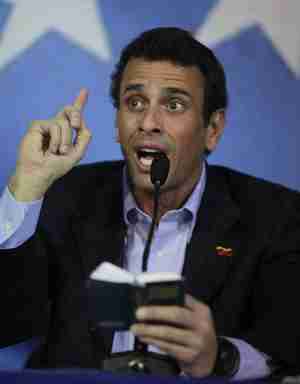 |
The fault line between the mestizos and the European descendants was clear from the fact that the political opposition, led by Henrique Capriles, did not attend the funeral at all, because they were told, "better that you don't come." Capriles gave an hour-long televised speech in which he called Maduro a bold-faced liar, nd accused him of using Hugo Chávez's funeral to campaign for the presidency:
"I tell you clearly, Nicolás [Maduro], I am not going to speak of the times you lied to the country, shamelessly," Capriles said. "The people have not voted for you, boy."
I don't know enough about the language and culture to be certain, but I'm pretty sure that "boy" is an epithet referring indirectly to Maduro as a dark-skinned mestizo. AP and Venezuelanalysis
(Comments: For reader comments, questions and discussion, see the 9-Mar-13 World View -- China urges calm as North and South Korea trade military threats thread of the Generational Dynamics forum. Comments may be
posted anonymously.)
(9-Mar-2013)
Permanent Link
Receive daily World View columns by e-mail
Donate to Generational Dynamics via PayPal
Venezuela's Hugo Chavez's body will be kept on permanent display
This morning's key headlines from GenerationalDynamics.com
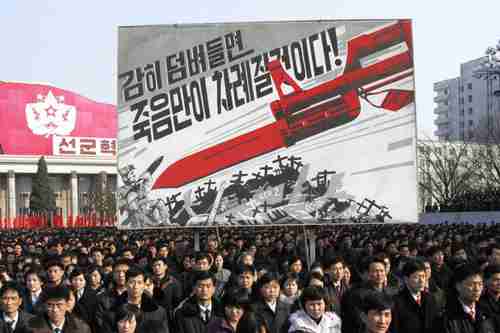 |
The United Nations Security Council unanimously passed a resolution on Thursday imposing new restrictions on North Korea in the areas of travel, banking and trade. The sanctions were imposed as punishment for N. Korea's recent tests of long-range missiles and nuclear weapons, in violation of United Nations resolutions. Even China supported the new resolution, having frequently expressed its strong disapproval of the tests.
In the last few days, N. Korea's public rhetoric has been getting increasingly shrill. First, they've said that they're canceling the 1953 armistice agreement that ended the fighting in the Korean War, even though we've technically still been at war ever since. It threatened "precision nuclear strikes" that will create a "sea of fire." And on Thursday it threatened to "exercise the right to a preemptive nuclear attack to destroy the strongholds of the aggressors and to defend the supreme interests of the country."
Would North Korea actually go ahead and launch a nuclear attack on either South Korea or the U.S. (assuming that it's really capable of doing so)? Many analysts point out that any such attack would be met with massive counterstrikes by both countries. In fact, the South Korea government announced on Thursday that in case of any provocation, they would target the highest ranks of the North Korean regime:
"When we refer to command, it usually signifies divisional or corps commanders. But if Seoul comes under attack, the top levels of North Korea's regime including [leader] Kim Jong-un could become targets."
However, we have some recent history that suggests a different scenario. In 2010, North Korea launched two separate attacks on South Korea, one a missile attack that sank a South Korean warship in international waters, and another that killed civilians on an offshore island. In both cases, N. Korea simply denied that they were responsible, and China backed them, even though no one doubted what they had done. The N. Korean denial gave cover to the South Koreans to back down and not retaliate in any way. So the N. Koreans simply got away with these deadly attacks on S. Korea.
So one could imagine that the N. Koreans learned a simple lesson from all this: If you're going to launch some kind of nuclear attack on S. Korea or the U.S., then do it in such a way as to preserve deniability, and you'll get away with it. And the way to do it and preserve deniability is to smuggle some kind of nuclear device into the target area and set it off remotely. There will be weeks or months of forensic investigations to prove that the N. Koreans did it, but in the end, the proof will never be 100% certain, and the Chinese will back them. LA Times and Chosun Ilbo (Seoul)
Following the death of Venezuela's president Hugo Chávez, acting president Nicolas Maduro said:
"I want to tell the nation and the world ... it has been decided to prepare the body of the comandante president, embalm it, so it can be eternally open for the people to have it there always.So, like Ho Chi Minh, like Lenin, like Mao Zedong, the body of our commander-in-chief will remain embalmed ... for our people to be able to have him forever."
The glass tomb will rest forever inside a future Museum of the Bolivarian Revolution.
One of the most amazing things about this situation is that the mainstream press is totally oblivious to what's going on here. I've heard one commentator after another express amazement at how wildly and enthusiastically beloved Chávez was, even after over a decade in office. I heard words like "unbelievable" and "it's a conundrum."
That's why when I wrote the article reporting Chávez's death, I emphasized that he was a mestizo (mixed blood), and that he was a hero to the other mestizos, comprising about 70% of Venezuelan population. Racial feelings run very deep in Latin America, and that 70% majority had been oppressed for decades by the "pure" European descendant élite minority, who had control of the government and businesses until Chávez was able to defeat them -- just as Simón Bolívar had defeated them two centuries ago. That's why Chávez was so wildly popular, even after over a decade in office: Because as badly as he messed things up in Venezuela, he was still considered hugely beloved since he had defeated the European oppressors.
As I understand it, Chávez has left a major bombshell behind for his successor. He won reelection for president last year, and he did so by borrowing huge sums of money, putting Venezuela very deeply in debt, and used the money to buy votes. The constitution calls for a new election within 30 days, and Chávez's anointed successor, Nicolas Maduro, is expected to win. He'll have to deal with the debt bombshell, and he doesn't have even a fraction of the charisma of Chávez. Latin American Herald Tribune
(Comments: For reader comments, questions and discussion, see the 8-Mar-13 World View -- N. Korea threatens death to America for U.N. Security Council vote thread of the Generational Dynamics forum. Comments may be
posted anonymously.)
(8-Mar-2013)
Permanent Link
Receive daily World View columns by e-mail
Donate to Generational Dynamics via PayPal
Syrian refugees top 1 million, flooding into neighboring countries
This morning's key headlines from GenerationalDynamics.com
 |
In 2007, China's premier Wen Jiabao famously said that China is 'unsteady, unbalanced, uncoordinated and unsustainable. In this week's speech, the outgoing premier indicated that things have only gotten worse, with widespread environmental destruction, a widening gap between rich and poor, and endemic official corruption:
"Some of these problems have built up over time, while others have emerged in the course of economic and social development, and still others have been caused by inadequacies and weaknesses in our government work."
Mao Zedong in 1949 said:
"I hope the day will come when all you can see from Tiananmen Gate is a forest of tall chimneys belching out clouds of smoke."
Mao's dreams have become a reality, as Beijing's skyline has many chimneys belching smoke. China uses coal for 70% of all its energy needs, and consumes about as much coal as all other countries combined.
But be careful what you wish for, because China's environmental destruction has become increasingly noticeable and severe. According to one expert:
"The biggest development in China lately has been the seepage of pollution into the ground water. Large-scale contamination of the water table is a terrible thing that will harm future generations, and the whole world, because ground-water pollution is very hard to clean up, and hugely expensive, and takes a very long time."
Even worse is the air pollution. In January, Bejing fine particle pollution rose to such high levels -- 20 times the "safe" level -- that it was difficult to breathe outdoors, and people were warned to stay indoors. In one city, a furniture factory burned down because the air was so thick with pollution that security guards didn't notice the smoke. Many of the country's rivers are so polluted that authorities do not permit residents to even touch the water, not to mention use it to irrigate fields. Fruit and grain grown in the country's contaminated and over-fertilized soil contains massive amounts of pollutants, and are unsafe to eat. (Some of them are imported into the U.S.)
Although Chinese bloggers are still angry about corruption, and the widening gap between rich and poor, the issue of environmental destruction has leapfrogged those issues, to the extent that the fury over toxic air, food and drinking water marks a political turning point. Radio Free Asia and Spiegel
China's history is filled with huge, massive internal rebellions (civil wars), the most recent of which were the Taiping Rebellion (1850-64) and Mao's Communist Revolution (1934-49). The leaders of China's Communist Party (CCP) are well aware of this history, and the fact that a new internal rebellion is now due, and possibly overdue.
In the same speech that China's outgoing premier Wen Jiabao expressed grave concern about widespread environmental destruction, a widening gap between rich and poor, and endemic official corruption, he announced that military spending will rise 10% to $114 billion and, more significantly, he announced that spending for "domestic security" will rise to an even higher figure, $124 billion.
The increase underscores the CCP's fears of increasing popular unrest. The number of "mass incidents" of unrest recorded by the Chinese government grew from 8,700 in 1993 to about 90,000 in 2010, according to several government-backed studies. Some estimates are higher, and the government has not released official data for recent years.
People sometimes ask me how it's possible for China to be preparing both for a civil war and an external war with the United States. The answer is provided by looking back at World War II. China was embroiled in a very bloody civil war from 1934 to 1949, but the two sides temporarily united to fight the external war. Reuters
The United Nations Human Rights Council (UNHCR) has identified Bushra, a 19-year-old mother of two, as the one-millionth Syrian refugee to register with the council. She signed up along with her 4-year-old daughter Batoul, and her 2-year-old son, Omar. Nearly 4 million of Syria's 22 million people have been driven from their homes by the civil war. Of the displaced, 2 million have sought cover in camps and makeshift shelters across Syria, 1 million have registered with UNHCR in neighboring Turkey, Jordan, Lebanon, Iraq and Egypt, and several hundred thousand more fled the country but haven't signed up with the UNHCR. Even worse, the number of refugees has been increasing every month. There were some 4,000 per day in December, and now it's close to 8,000 per day. This situation is creating an increasing crisis for neighboring countries, which are unable to handle the flood of refugees. AP
With the flood of Syrian refugees threatening to destabilize the entire region, on Wednesday the Arab League for the first time voted to say that Arab States are free to offer military support to Syrian rebels. Previously, the League had said that only humanitarian aid should be provided. According to the final statement,
"[The League] stressed the right of each state according to its wishes to offer all types of self defense, including military, to support the resilience of the Syrian people and the Free [Syrian] Army."
In addition, the Arab League offered the opposition Syrian National Coalition (SNC) to occupy Syria's seat at the League. Syria was expelled from the League in November 2011, after it became clear that the regime of president Bashar al-Assad was conducting an extermination policy, targeting innocent people in their homes, hospitals and schools. It's been rumored that Qatar and Saudi Arabia have been secretly supplying weapons to the Syrian rebels for some time, but this is the first time that supplying weapons has been openly approved. As we've been reporting, Syria is increasingly turning into a proxy war. The National (UAE)
(Comments: For reader comments, questions and discussion, see the 7-Mar-13 World View -- China's Wen Jiabao warns of unrest and widespread environmental destruction thread of the Generational Dynamics forum. Comments may be
posted anonymously.)
(7-Mar-2013)
Permanent Link
Receive daily World View columns by e-mail
Donate to Generational Dynamics via PayPal
Venezuela accuses America of conspiracy to kill Hugo Chavez
This morning's key headlines from GenerationalDynamics.com
 |
Venezuela's people were stunned Tuesday by the news from vice president Nicolas Maduro that president Hugo Chávez had died. Maduro cried and had tears running down his face as he announced that Chávez died at 4:25 pm local time (3:55 pm ET) "after battling hard against an illness for nearly two years." Chávez has not appeared in public since his fourth cancer treatment in Cuba in December. When he returned to Venezuela on February 11, his supporters were overjoyed, though some wondered if he was returning home to die. It now appears that was the case, although the reason for his death was not announced.
According to Venezuela's constitution, there must be a new election within 30 days. The military has announced that will enforce the constitution, and not permit chaos to ensue. Chávez has previously anointed Maduro as his successor. Maduro is a hard-core anti-American socialist like Chávez, but he's entirely lacking in Chávez's charisma. The man that Chávez defeated in last year's election, the youthful Miranda state Gov. Henrique Capriles, is expected to run against Maduro.
Chávez has said that he considers Cuba's Fidel Castro to be like a father to him, and a lot of people expected Chávez to live longer than Castro, who is still alive but unwell. The two socialists forged a close relationship, especially when Cuba's rich sponsor, the Soviet Union, collapsed, ending Russian subsidies to Cuba. But Venezuela stepped in with its own subsidies. Maduro will undoubtedly wish to continue the subsidies to Cuba, but without Chávez's charisma, and with a faltering Venezuelan economy, he may be forced to back down. AP and BBC
Several hours prior to the death of Venezuela's president Hugo Chávez, vice president Nicolas Maduro gave a vitriolic press conference blaming "imperial forces," particularly from the United States, of a conspiracy to kill Chávez. The accusation stems from remarks made by Chávez himself in December 2011. Chávez made his remarks the day after Argentina's president Cristina Fernández de Kirchner announced she had been diagnosed with thyroid cancer. Recent years have seen a series of leftwing Latin America leaders diagnosed with cancer, including Brazil's president, Dilma Rousseff, Paraguay's Fernando Lugo, and the former Brazilian leader Luiz Inácio Lula da Silva. According to Chávez, in a speech broadcast on live TV:
"Would it be so strange that they've invented the technology to spread cancer and we won't know about it for 50 years?I don't know but … it is very odd than we have seen Lugo affected by cancer, Dilma when she was [presidential] candidate, me, going into an election year, not long ago Lula and now Cristina.
It is very hard to explain, even with the law of probabilities, what has been happening to some leaders in Latin America. It's at the very least strange, very strange. Evo take care of yourself. Correa, be careful. We just don't know. Fidel always told me, 'Chávez take care. These people have developed technology. You are very careless. Take care what you eat, what they give you to eat … a little needle and they inject you with I don't know what.'"
According to Maduro on Tuesday, there will be an investigation to see whether Chávez was inoculated with the cancer that killed him. Maduro announced that one of the alleged conspirators, US Defense Attaché David del Mónaco, was the mastermind of the plot, and "He has been evicted; he has 24 hours to leave Venezuela; our armed forces should be respected; we have forwarded a legal notice to the US government." El Universal and Guardian (December 2011)
Racism is a big problem throughout Latin America, based on three population sources: The indigenous "Amerindians" that have been around for centuries prior to 1492; Christopher Columbus made his first visit in 1492, and led the European invasion and colonization of Latin America; and black Africans were brought into Latin America originally as slaves. Intermarriage among these groups has dulled the boundaries. Offspring of European-African marriages are called "mulattos," and offspring of European-Amerindian marriages are called "mestizos." Of course, further intermarriage dulled even these divisions, and in Venezuela today, the word "mestizo" for anyone who isn't a "pure" European white. (There's also a "pure" indigenous population, but it's small, around 2%.)
The Spanish colonized and took control of most of Latin America. The first leader to defeat the Spanish was Simón Bolívar. Here's a brief history of Simón Bolívar from the Bolivar, Missouri, web site:
"Simon Bolivar (1783-1830)Simon Bolivar was one of South America's greatest generals. His victories over the Spaniards won independence for Bolivia, Panama, Colombia, Ecuador, Peru, and Venezuela. He is called El Liberator (The Liberator) and the "George Washington of South America."
Bolivar was born in July 24, 1783, at Caracas, Venezuela. His parents died when he was a child and he inherited a fortune. As a young man, he traveled in Europe.
As he returned to Venezuela, Bolivar joined the group of patriots that seized Caracas in 1810 and proclaimed independence from Spain. He went to Great Britain in search of aid, but could get only a promise of British neutrality. When he returned to Venezuela, and took command of a patriot army, he recaptured Caracas in 1813 from the Spaniards.
The Spaniards forced Bolivar to retreat from Venezuela to New Granada (now Colombia), also at war with Spain. He took command of a Colombian force and captured Bogota in 1814. The patriots, however, lacked men and supplies, and new defeats led Bolivar to flee to Jamaica. In Haiti he gathered a force that landed in Venezuela in 1816, and took Angostra (now Ciudad Bolivar). He also became dictator there.
Bolivar marched into New Granada in 1819. He defeated the Spaniards in Boyar in 1819, liberating the territory of Colombia. He then returned to Angostura and led the congress that organized the original republic of Colombia (now Ecuador, Colombia, Panama, and Venezuela). Bolivar became its first president on December 17, 1819.
Bolivar crushed the Spanish army at Carabobo in Venezuela on June 24, 1821. Next, he marched into Ecuador and added that territory to the new Colombian republic. After a meeting in 1822 with another great liberator, Bolivar became dictator of Peru. His army won a victory over the Spaniards at Auacucho in 1824, which needed Spanish power in South America. Upper Peru became a separate state, named Bolivia in Bolivar's honor, in 1825. The constitution, which he drew up for Bolivia, is one of his most important political pronouncements."
Venezuela's last crisis war was shared with Colombia, where most of the genocide and destruction took place. It took place from 1948-58, and was known as "La Violencia," or the Colombian Revolt. More than 200,000 persons lost their lives and more than a billion dollars of property damage was done.
Until the last few decades, Venezuelan social structure was quite rigidly organized along class and racial lines, with a small number of direct white European descendants as a market and government dominant minority. Hugo Chávez, himself a mestizo, considered himself to be the new Simón Bolívar, and began the Bolivarian movement in the 1990s. He defeated the élite European descendants, and used Venezuela's oil wealth to make himself a hero to the mestizo majority. Country Studies - Venezuela and Bolivar history and On War - La Violencia
(Comments: For reader comments, questions and discussion, see the 6-Mar-13 World View -- Venezuela's mestizo president Hugo Chavez dies of cancer thread of the Generational Dynamics forum. Comments may be
posted anonymously.)
(6-Mar-2013)
Permanent Link
Receive daily World View columns by e-mail
Donate to Generational Dynamics via PayPal
30 million locusts descend on Egypt in 'Biblical' plague
This morning's key headlines from GenerationalDynamics.com
 |
Some 30 million locusts came to Egypt over the weekend, destroying crops on tens of thousands of acres of farmland. A particularly bad swarm infested a major Cairo market on Saturday. They appear to have originated in Sudan and traveled up the Red Sea coast to Egypt, Eritrea and Saudi Arabia. Worldwide, global damage from locusts in a single year can reach hundreds of millions of dollars. Locusts feed on a wide variety of plant species – including leaves, flowers, fruit, seeds and tree bark. One ton of locusts -- a small part of a locust pack -- can consume enough food meant for 2,500 people. Next in line for the locusts could be Israel, Jordan and Lebanon, and all three countries have been put on alert. Al-Ahram (Cairo) and Jerusalem Post
At the Chinese People's Political Consultative Conference (CPPCC) National Committee opened its annual meeting on Monday, China defended its booming military spending and massive military buildup saying that they contributed to global peace and stability. According to a spokesman:
"As such a big country, China's inability to ensure its own security would not be good news for the world. Our strengthening of our defense is to defend ourselves, to defend security and peace, and not to threaten other countries."
China has not yet announced its military budget for 2013, but is expected to do so as early as Tuesday. Military spending has grown substantially each year for more than 20 years, and last year rose 11.2 percent to $106.4 billion an increase of about 67 billion. However, the Pentagon believes that China's military budget is substantially higher than China is claiming. AP
China’s DF-21D anti-ship ballistic missile (ASBM) is no longer merely an aspiration. Beijing has already successfully developed, partially tested and deployed in small numbers the world’s first weapons system capable of targeting American aircraft carriers from long-range, land-based mobile launchers. Beijing expects to achieve a growing degree of deterrence with it. What is perhaps most surprising is the foreign skepticism and denial that has accompanied the DF-21D, though officials were in similar denial about many things prior to World War II. China has tested all the DF-21 components over land, but the ability to employ it against a moving, uncooperative sea-surface target remains unproven. China may be avoiding making such a test, for fear of alarming all of China's neighbors. The U.S. has defensive weapons to counter a DF-21 attack, but sequestration could hinder efforts to maintain and enhance those defenses. Jamestown
(Comments: For reader comments, questions and discussion, see the 5-Mar-13 World View -- China defends its booming military spending as promoting global peace thread of the Generational Dynamics forum. Comments may be
posted anonymously.)
(5-Mar-2013)
Permanent Link
Receive daily World View columns by e-mail
Donate to Generational Dynamics via PayPal
The 'Harlem Shake' is shaking up the Mideast
This morning's key headlines from GenerationalDynamics.com
 |
The Taliban terror jihad against Shia Muslims in Pakistan continued on Sunday when two terrorist bombs, planted in a Shia neighborhood near a Shia Muslim mosque, exploded, killing 47 and injuring hundreds. The first bomb was planted in a vehicle and exploded via a remote signal. The second bomb exploded shortly thereafter. Tehrik-i-Taliban Pakistan (TTP - the Pakistan Taliban) has apparently applauded the bombings, but claim they weren't responsible. TTP-linked Lashkar-e-Jhangvi (LeJ), has been perpetrating one Shia Muslim bloodbath after another (see "18-Feb-13 World View -- Protests boil across Pakistan after mass slaughter of Quetta Shias"), and is suspecting of Sunday's bombing, but they haven't yet claimed responsibility. There is a rising fury among the Shia Muslims in Pakistan that the government is either in league with TTP to kill Shias, or at the least is afraid of TTP. Dawn (Karachi) and BBC
When the Indian subcontinent was partitioned into Pakistan and India in 1947, what is now known as Bangladesh was made part of Pakistan, and called East Pakistan. With East and West Pakistan separated by the vast expanse of India, the two regions didn't get along. The 1947 Partition war was a generational crisis war for (West) Pakistan, but not for East Pakistan. In 1971, East Pakistan fought a liberation war from (West) Pakistan, resulting in independence for Bangladesh. (See "FBI will aid Bangladesh investigation of border guard officer massacre" from March, 2009.)
But the 1971 war was actually an ethnic generational crisis civil war between the market and government dominant Bahari minority versus the Bengali majority. This was also a proxy war between Pakistan, who sided with the dominant Baharis, and India, who sided with the Bengalis. During the war, as many as 3 million people were killed, and hundreds of thousands raped, allegedly by the Baharis, supported by the West Pakistan army. When the war ended, the Bengalis got revenge with brutal violence against the defeated Bahari minority, including rapes, mutilations, butchery, torture and murder. Associated Press, December 20, 1971
Today, Bangladesh is in a generational Awakening/Unraveling era, and a war crimes conviction, and there is a war crimes tribunal in progress to prosecute perpetrators of crimes against humanity. Hundreds of thousands of demonstrators have been massing for weeks to protest economic conditions. But the conviction last week of Delwar Hossain Sayedee for war crimes in 1971 has triggered new ethnic violence. Soldiers are being deployed to control the spreading violence between demonstrators and police, which has resulted so far in 58 casualties.
So, (West) Pakistan is in a generational Crisis era, and we can expect that violent attacks by Sunni Taliban-linked terrorists against Shia Muslims to lead to a new civil war. But Bangladesh is in an Awakening/Unraveling era, so the current clashes are expected to fizzle before long. Guardian (London)
The "Harlem Shake," a viral dance craze invented by Australian teenagers a few weeks ago, is being used by protesters in Tunisia and Egypt to demonstrate against Islamist governments. In Tunisia, Salafists tried unsuccessfully to stop the filming of a staging of the Harlem Shake at a Tunis school last week. However, the staging was completed, and video footage, which shows participants smoking, dancing wildly in uncoordinated manner and simulating sexual acts, has spread on the Internet, attracting millions of views. Egypt's anti-Muslim Brotherhood protesters have copied the idea. A group of Egyptians posted videos of themselves on YouTube doing the "Harlem Shake" in front of the Giza pyramids, with one of them, wearing white underwear and a bow tie, dancing while riding a camel. A number of social media sites run by Salafists and other Islamist groups have denounced the "Harlem Shake" as indecent, with participants smoking, dancing wildly and simulating sexual acts. Middle East Online (London) and Daily Star (Beirut)
(Comments: For reader comments, questions and discussion, see the 4-Mar-13 World View -- Nearly 60 dead in four days of deadly ethnic clashes in Bangladesh thread of the Generational Dynamics forum. Comments may be
posted anonymously.)
(4-Mar-2013)
Permanent Link
Receive daily World View columns by e-mail
Donate to Generational Dynamics via PayPal
Gun control talk increases public interest in 3D Printing
This morning's key headlines from GenerationalDynamics.com
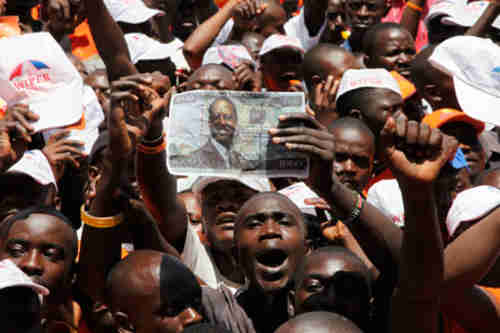 |
Kenya's current prime minister, Raila Odinga, on Saturday accused his opponents of planning to rig the vote in Monday's presidential election, and said that if he loses, it will be because of "blackmail and intimidation":
"I have warned them the consequences may be worse than last time round. The people will not stomach another rigging."
The "last time around" that he's referring to was the last election, in late December 2007, which was followed by massive ethnic violence between Odinga's Luo tribe, and his opponent's Kikuyu tribe. (See "Post-election massacre in Kenya raises concerns of tribal war")
For Monday's presidential election, the two leading candidates are Odinga once again, facing another Kikuyu candidate, Uhuru Kenyatta, the son of Kenya's first president, Jomo Kenyatta, the "founding father" of Kenya as a nation. Kenyatta called Odinga's threat "dangerous and inflammatory," and demanded a rejection. Odinga issued a statement saying that he had been misquoted.
The Luo and Kikuyu tribes have had many ethnic wars in the past, and a new one would not be a surprise. Kenya's last generational crisis war was the Mau-Mau rebellion, which climaxed in 1956, so enough time has passed, and a new generational crisis war is a possibility.
However, there are 8 candidates in Monday's election, and the rules require a vote over 50% to be a winner. Odinga and Kenyatta are each expected to get a plurality and lead the vote, but neither is expected to gain a majority, so some analysts believe that this outcome will mean no violence this time. However, this outcome will force a run-off election in April, and tensions may be higher than ever at that time. ABC News and AP
Chad's army claims to have killed terrorist leader Mokhtar Belmokhtar, who led January's attack on an Algerian gas plant where at least 37 hostages were killed. (See "18-Jan-13 World View -- Did France kick a hornet's nest with military intervention in Mali?".)
Belmokhtar began a two-decade career of Islamic militancy, first as a member of Algeria's Islamic Armed Group in the country's civil war, then as a joint founder of the Salafist Group for Preaching and Combat (SGPC), which later evolved into Al-Qaeda in the Islamic Maghreb (AQIM). However, after an AQIM leadership split, Belmokhtar formed his own terrorist group, the Khaled Abu al-Abbas Brigade, which claimed responsibility for the attack on the gas plant.
Chad's army also claims to have killed another AQIM leader, Adelhamid Abou Zeid, in Mali on Friday. The deaths cannot be confirmed until DNA tests have been completed, but if the claims are true, then it will al-Qaeda terrorists in Mali back for a couple of months, until they can regroup. Guardian (London) and Reuters
Talk of gun control, which is one of Washington's stupidest ideas, in a city where extreme stupidity is the hallmark of everyone from the president on down, is having more unintended consequences. It's already been reported that gun owners and would-be gun owners are buying up all the guns and ammunition they can find, for fear of losing the opportunity.
When I wrote about gun control in December, I pointed out that there's no evidence that prohibitions in the past -- of alcohol, drugs, abortion and prostitution -- had any actual effect, but they had a large negative effect of creating bootleggers, organized crime, drug cartels and prostitution rings.
I particularly mentioned that 3D printing would, within a couple of years, allow anyone to manufacture guns in his garage or basement. That day is arriving much more quickly as another unintended consequence of the talk of gun control. Media attention has increased, including a great deal of coverage by al-Jazeera on how 3D printing would effectively end gun control in the UK.
A Texas gunsmith, Cody Wilson, last year demonstrated a 3D-printed AR-15 semi-automatic rifle, but his work was ridiculed because the gun fell apart after firing six rounds. However, Wilson has fixed the design flaws, and has now demonstrated an AR-15 that can shoot 600 rounds without failing. He's put his entire design template on the internet for anyone to download and use with their own 3D printers.
Manufacturing an AR-15 with a 3D printer is still an expensive affair. The printer itself costs several thousand dollars, and then each gun takes 9-12 hours of print time and costs $150 in materials. But within a couple of years, those prices will have come down, and there will be even more advanced templates available on the internet available for anyone with a 3D printer to use. Al-Jazeera and Ars Technica
Josh Welsh, a second grader with attention deficit disorder in Baltimore, was suspended for "manufacturing" his own gun. He was eating a strawberry tart, and decided to shape it into a mountain, but apparently the result looked like a gun. The teacher became furious, and Josh was suspended for two days. Fox News
(Comments: For reader comments, questions and discussion, see the 3-Mar-13 World View -- Kenya: Presidential candidate threatens violence if he loses thread of the Generational Dynamics forum. Comments may be
posted anonymously.)
(3-Mar-2013)
Permanent Link
Receive daily World View columns by e-mail
Donate to Generational Dynamics via PayPal
Euro zone unemployment rises to record level
This morning's key headlines from GenerationalDynamics.com
 |
Turkey and Israel have had almost no diplomatic relations for almost three years, ever since an Israeli commando raid in May, 2010, killed nine Turkish men. The commando raid was on a "Freedom Flotilla" ship, the Mavi Marmara, that was attempting to break the Israeli sea blockade on Gaza. Israel has expressed "regret," but refused to apologize for its actions in the raid, infuriating Turkey's prime minister Recep Tayyip Erdogan. But now, the Turkish weekly Radikal is reporting that Israel may have found a formula to apologize to Turkey for “operational errors” during the raid on the Mavi Marmara. An apology in the past has been blocked by Israel's former Foreign Minister Avigdor Lieberman, but Lieberman is now on hiatus, facing charges of corruption, opening a window in Israel's government for an apology. Despite the diplomatic tensions between Israel and Turkey, trade has between the two countries has been rising. Arab News
A speech by Turkey's Prime Minister Recep Tayyip Erdogan on Wednesday in Vienna contained the following sentence:
"As is the case for Zionism, anti-Semitism and fascism, it is inevitable that Islamophobia be considered a crime against humanity."
(Hmmmm. I wonder if hating asparagus is also a crime against humanity?)
Anyway, American Secretary of State John Kerry called the remark "objectionable." Israel's prime minister Benjamin Netanyahu called Erdogan's comment "dark and mendacious statement, the likes of which we thought had passed from the world." However, Erdogan apparently retracted the comment. The official Anatolia news agency has sent out a correction, removing the reference to Zionism from Erdogan's remarks, an hour after reporting them. It said the correction was "made by the source" but gave no other explanation.
However, Turkey's Foreign Minister Ahmet Davutoglu, said that there was still good reason for relations with Israel to be poor. Davutoglu said that Turkey had always stood against anti-Semitism, and that Turkey had presented numerous opportunities to Israel to restore relations, but:
"If we must talk about hostile acts, then Israel's attitude and its brutal killing of nine of our civilian citizens in international waters may be called hostile. ...If Israel wants to hear positive statements from Turkey, it needs to review its attitude. It needs to review its attitude toward us, and it needs to review its attitude toward the people in the region and especially the West Bank settlements issue."
Zaman (Istanbul) and Deutsche-Welle (Berlin)
On Friday, Turkey's Foreign Minister Ahmet Davutoglu claimed that the U.S. and Turkey have exactly the same objectives for Syria. However, evidence is growing that American and Turkish objectives are diverging. In particular, Turkey is providing support to Islamists and even jihadists in Turkey, and would like to see a Sunni Islamist government replace the regime of Syria's president Bashar al-Assad. He is showing no sympathy at all for the Alawite, Christian and Kurdish communities. Turkey is thus aligned with Saudi Arabia and Qatar, who are reportedly supplying weapons to opposition fighters. America and the West, however, want to support only non-Islamist opposition fighters, and fears that any support given to jihadists will eventually be used against the West. Tensions are building throughout the Mideast over the situation in Syria, which is increasingly appearing to be a proxy war involving the West versus Turkey + Saudi Arabia + Qatar versus Russia + Iran + Iraq + Hezbollah + the al-Assad regime. Al-Monitor (Washington) and Arab News (Saudi Arabia)
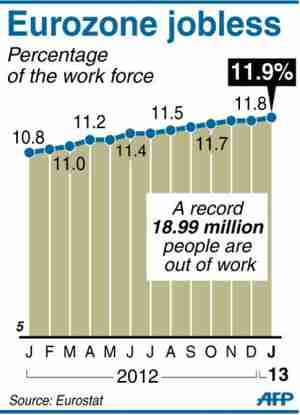 |
The euro zone jobless rate rose to 11.9% in January, a record level. Eurozone youth unemployment rose to 24.2%. Spain had the highest unemployment rate at 26.2%, with youth unemployment rate at 55.5%. The eurozone inflation rate fell to 1.8% in February, well below the European Central Bank's target rate. Gross domestic product (GDP) contracted 0.6% in the fourth quarter of last year, and is expected to decline again in the current quarter. Irish Times and AFP
Personal income in January plummetted 3.6% in January, the biggest one-month decrease since 1993, partly due to a pullback from the December holiday surge, and also due to tax increases in January. However, the good news is that even though they had a smaller income, they spent more money -- 0.2% more than in December. eCreditDaily
(Comments: For reader comments, questions and discussion, see the 2-Mar-13 World View -- Syria conflict turning into a proxy war thread of the Generational Dynamics forum. Comments may be
posted anonymously.)
(2-Mar-2013)
Permanent Link
Receive daily World View columns by e-mail
Donate to Generational Dynamics via PayPal
German official says that 'two clowns have won' in Italy
This morning's key headlines from GenerationalDynamics.com
The web site GenerationalDynamics.com is now up and running on a new web hosting company. I'll have more to say about the Network Solutions nightmare later, but for now I'm hoping that the "web site crisis" is over for a while.
 |
Italian officials are furious and have canceled talks with Germany, after German politician Peer Steinbrueck said of Italy's recent parliamentary elections:
"To a certain extent, I’m appalled that two clowns have won. One professional clown who is also not offended if you call him one – Grillo – and another who is clearly a clown with a testosterone boost."
The clown who is not offended would be Beppe Grillo, a former standup comedian turned renegade politician who did amazingly well, with his "Five Star Movement" coming in a solid third in Italy's election. The other alleged clown would be former prime minister Silvio Berlusconi, who has long been mired in sex scandals.
Actually, neither Grillo nor Berlusconi won. The problem is that nobody won, and Italy has no government, and has little hope of having one soon, perhaps not before another election. What the voters did do is send a strong message to Germany that they don't want any more Teutonic austerity forced on them, and the fear around Europe is that the euro crisis is returning. Telegraph (London) and Euro News
Fast Food chain McDonald's France has promised to serve "100% French" French Fries before the end of the year in all its 1260 restaurants. In 2012, McDonald's bought 30% of its 200,000 tonnes of potatoes from outside France, mostly from Belgium. But now McDonald's has contracted with McCain France to contract 100 more potato farmers, who will supply McDonald's with all the additional potatoes it needs to makes its French fries 100% French. Potato Pro
U.S. intelligence agencies have detected that China's military is shifting its mobile ballistic missiles to the coast near the Senkaku/Diaoyu islands in preparation for war with Japan over the islands. A Hong Kong newspaper, the Oriental Daily News, quotes a military source as saying that the People's Liberation Army were preparing to target the Senkaku islands, as well as U.S. military bases in Okinawa. The report also claims that the multiple-warhead DF-16 missile can defeat the U.S.-made Patriot missile batteries deployed at U.S. and Japanese military bases in the region. The fear is that a small-scale military conflict between Japan and China would spiral into a major war, since the U.S. military are committed by treaty to defending Japan. Free Beacon
 |
The owner of a Beijing restaurant specializing in pigs' offal dishes finally took down a sign that said: "This shop does not receive The Japanese, The Philippines [sic], The Vietnamese and dog." China is having island disputes with Japan, the Philippines and Vietnam. The owner is not apologizing, and says
"It was a patriotic action. ... I just didn't want to serve Japanese. Am I not allowed to do that?"
He took it down because he was tired of responding to media requests. The picture of the sign went viral on social media sites after a Brooklyn housewife visiting Beijing posted it, drawing hundreds of comments. Global Times (Beijing) and Thanh Nien News (Ho Chi Minh City) and Japan Daily News
(Comments: For reader comments, questions and discussion, see the 1-Mar-13 World View -- China moves missiles near coast to target Japan thread of the Generational Dynamics forum. Comments may be
posted anonymously.)
(1-Mar-2013)
Permanent Link
Receive daily World View columns by e-mail
Donate to Generational Dynamics via PayPal
Web Log Summary - 2016
Web Log Summary - 2015
Web Log Summary - 2014
Web Log Summary - 2013
Web Log Summary - 2012
Web Log Summary - 2011
Web Log Summary - 2010
Web Log Summary - 2009
Web Log Summary - 2008
Web Log Summary - 2007
Web Log Summary - 2006
Web Log Summary - 2005
Web Log Summary - 2004
Web Log - December, 2016
Web Log - November, 2016
Web Log - October, 2016
Web Log - September, 2016
Web Log - August, 2016
Web Log - July, 2016
Web Log - June, 2016
Web Log - May, 2016
Web Log - April, 2016
Web Log - March, 2016
Web Log - February, 2016
Web Log - January, 2016
Web Log - December, 2015
Web Log - November, 2015
Web Log - October, 2015
Web Log - September, 2015
Web Log - August, 2015
Web Log - July, 2015
Web Log - June, 2015
Web Log - May, 2015
Web Log - April, 2015
Web Log - March, 2015
Web Log - February, 2015
Web Log - January, 2015
Web Log - December, 2014
Web Log - November, 2014
Web Log - October, 2014
Web Log - September, 2014
Web Log - August, 2014
Web Log - July, 2014
Web Log - June, 2014
Web Log - May, 2014
Web Log - April, 2014
Web Log - March, 2014
Web Log - February, 2014
Web Log - January, 2014
Web Log - December, 2013
Web Log - November, 2013
Web Log - October, 2013
Web Log - September, 2013
Web Log - August, 2013
Web Log - July, 2013
Web Log - June, 2013
Web Log - May, 2013
Web Log - April, 2013
Web Log - March, 2013
Web Log - February, 2013
Web Log - January, 2013
Web Log - December, 2012
Web Log - November, 2012
Web Log - October, 2012
Web Log - September, 2012
Web Log - August, 2012
Web Log - July, 2012
Web Log - June, 2012
Web Log - May, 2012
Web Log - April, 2012
Web Log - March, 2012
Web Log - February, 2012
Web Log - January, 2012
Web Log - December, 2011
Web Log - November, 2011
Web Log - October, 2011
Web Log - September, 2011
Web Log - August, 2011
Web Log - July, 2011
Web Log - June, 2011
Web Log - May, 2011
Web Log - April, 2011
Web Log - March, 2011
Web Log - February, 2011
Web Log - January, 2011
Web Log - December, 2010
Web Log - November, 2010
Web Log - October, 2010
Web Log - September, 2010
Web Log - August, 2010
Web Log - July, 2010
Web Log - June, 2010
Web Log - May, 2010
Web Log - April, 2010
Web Log - March, 2010
Web Log - February, 2010
Web Log - January, 2010
Web Log - December, 2009
Web Log - November, 2009
Web Log - October, 2009
Web Log - September, 2009
Web Log - August, 2009
Web Log - July, 2009
Web Log - June, 2009
Web Log - May, 2009
Web Log - April, 2009
Web Log - March, 2009
Web Log - February, 2009
Web Log - January, 2009
Web Log - December, 2008
Web Log - November, 2008
Web Log - October, 2008
Web Log - September, 2008
Web Log - August, 2008
Web Log - July, 2008
Web Log - June, 2008
Web Log - May, 2008
Web Log - April, 2008
Web Log - March, 2008
Web Log - February, 2008
Web Log - January, 2008
Web Log - December, 2007
Web Log - November, 2007
Web Log - October, 2007
Web Log - September, 2007
Web Log - August, 2007
Web Log - July, 2007
Web Log - June, 2007
Web Log - May, 2007
Web Log - April, 2007
Web Log - March, 2007
Web Log - February, 2007
Web Log - January, 2007
Web Log - December, 2006
Web Log - November, 2006
Web Log - October, 2006
Web Log - September, 2006
Web Log - August, 2006
Web Log - July, 2006
Web Log - June, 2006
Web Log - May, 2006
Web Log - April, 2006
Web Log - March, 2006
Web Log - February, 2006
Web Log - January, 2006
Web Log - December, 2005
Web Log - November, 2005
Web Log - October, 2005
Web Log - September, 2005
Web Log - August, 2005
Web Log - July, 2005
Web Log - June, 2005
Web Log - May, 2005
Web Log - April, 2005
Web Log - March, 2005
Web Log - February, 2005
Web Log - January, 2005
Web Log - December, 2004
Web Log - November, 2004
Web Log - October, 2004
Web Log - September, 2004
Web Log - August, 2004
Web Log - July, 2004
Web Log - June, 2004